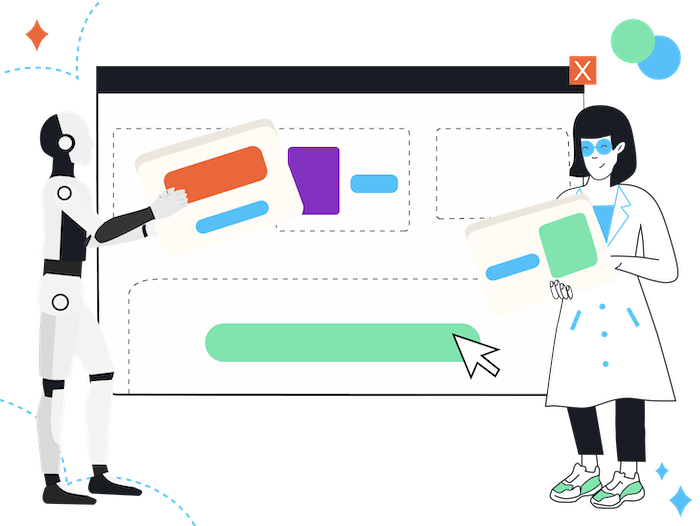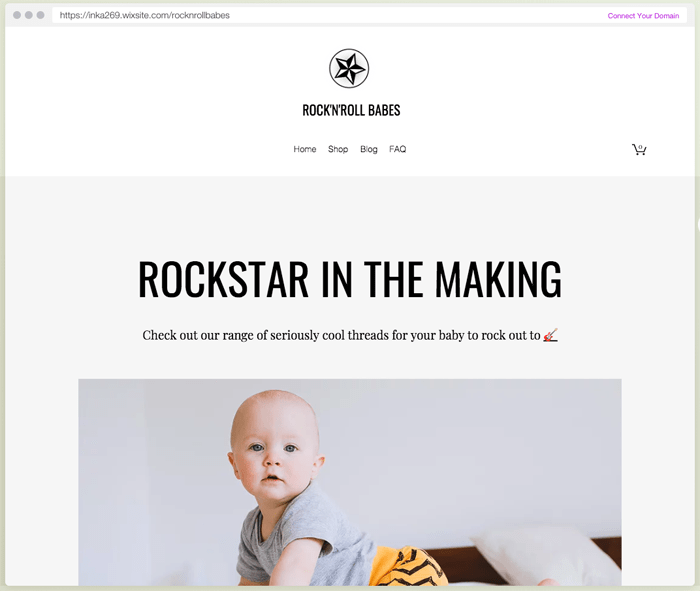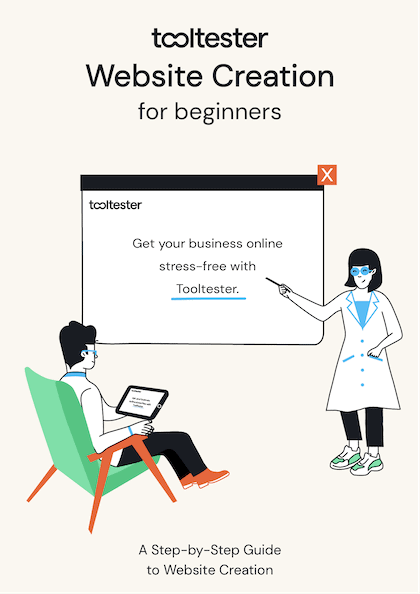Tooltester is supported by readers like yourself. We may earn an affiliate commission when you purchase through our links, which enables us to offer our research for free.
AI-powered digital tools are nothing new, with AI website builders being around for a few years now.
But the launch of tools like ChatGPT has, perhaps for the first time, gotten people really excited about the possibilities of using artificial intelligence in creating online content.
We’ve all seen how impressively well-written the content generated by ChatGPT or other competing AI writers can be.
Which might lead you to wonder – are AI-generated website builders just as intelligent?
While the AI website builder industry has historically been full of tools that overpromise and underdeliver, the good news is that today, we have a small but decent range of AI website builders available to us.
Many of these aim to create beautiful, fully-functional websites quickly and intelligently – with very little input from users.
So, if you like the idea of having a website quickly and easily built for you – or you’re simply just curious – read on as I walk you through my experiences with using the most popular AI web builders on the market.
What is an AI Website Builder?
AI website builders promise to simplify the website creation process drastically. Their target audience are beginners who normally would find it too complicated to create their own websites.
Through a series of questions, the AI website builder gathers all the information needed to set up a website draft that is already personalized with industry-specific content.
They typically offer the option to connect to web profiles such as Instagram, Facebook and Google My Business, from which they pull the logo, images and descriptive texts of the business.
The tradeoff is usually limited customization and fewer features compared to more classic website builders.
The 11 Best AI Website Builders
Here is our list of favorite AI website building tools:
- Wix AI Website Builder
- Dorik
- Jimdo
- GoDaddy
- Durable
- Hostinger Website Builder
- 10Web AI Builder
- GetResponse Website Builder
- Shopify AI
- Webnode
- Squarespace
Here is our video review where we discuss Wix AI Builder, Jimdo, Hostinger Website Builder and 10Web:
Read on to find out even more about each of them.
1. Wix AI Website Builder
Wix (read the full review) have built a reputation for themselves as one of the most innovative website builders in the market.
So it’s no surprise that they’d be blazing the trail for AI website builders, too.
Wix AI Builder was launched in mid-2016, making it one of the first AI-powered website builders on the scene – and blowing ill-fated competitors like The Grid right out of the water.
How? Well, let’s take a look.
How fast is it to set up a site?
Really fast. You start off by telling the assistant what kind of site you want to create. This AI website builder supports most types of websites, including ecommerce features, blogs, business, portfolio and photography sites, restaurants, etc.
All you need to do is choose to create a site with the Editor and then select to get a custom-built website. In my case, I wanted to set up an online store, and I was able to specify baby clothing as a category. You can also start with a conversation using its AI chatbot.
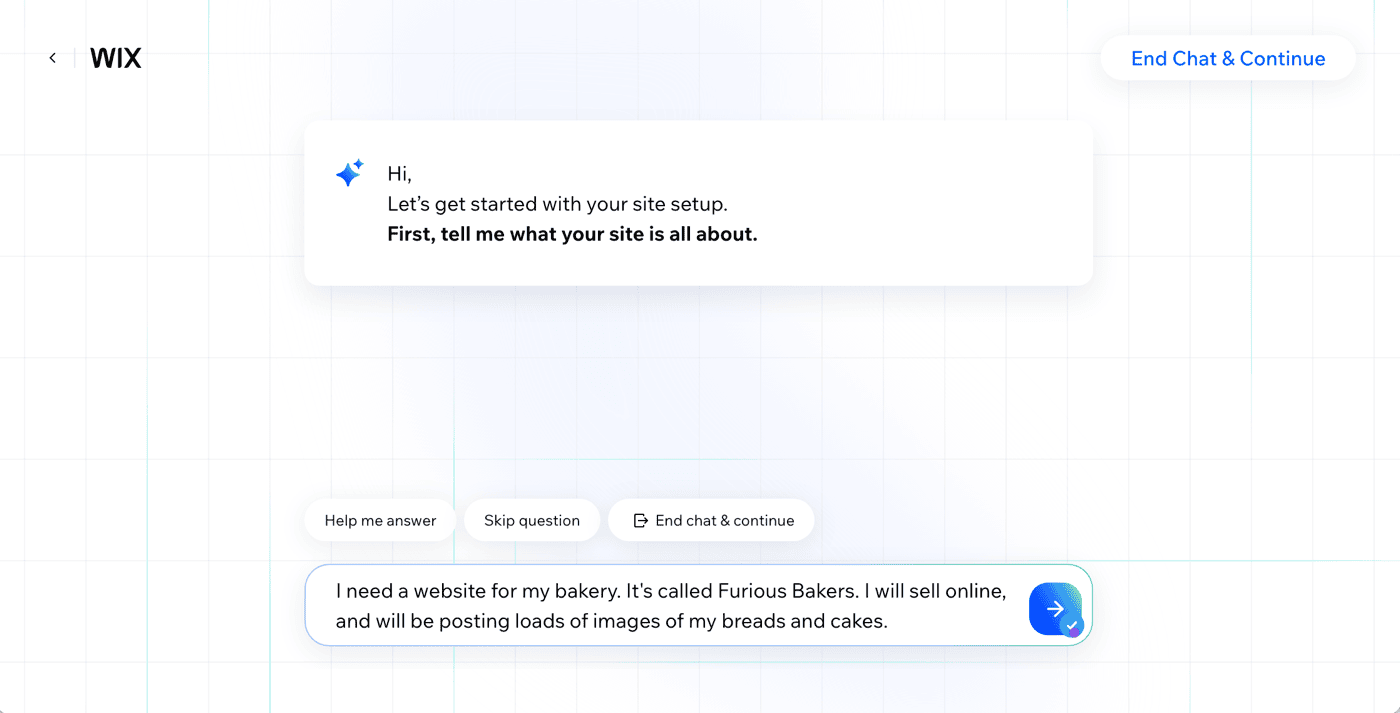
You’re then asked a series of questions about your business name, location, as well as any extra features you want for your site. You also get to pick the kind of theme you want for your site.
Based on your responses, as well as any existing information Wix can find on your business/site (e.g. social media), Wix will suggest some website designs for your to choose from:
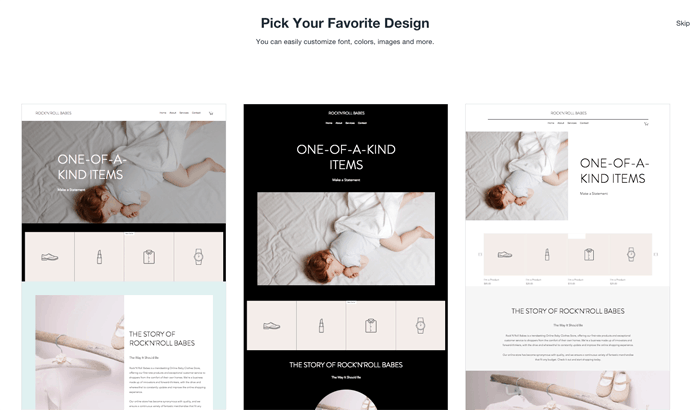
Once it’s done collecting this information, Wix AI Website Builder does its magic, and provides you with a fully-featured site that’s ready to customize. The whole process takes 2 minutes tops, and by prepopulating things such as logos and contact information, this AI solution cuts down the work you have to do to get the site ready for launch.
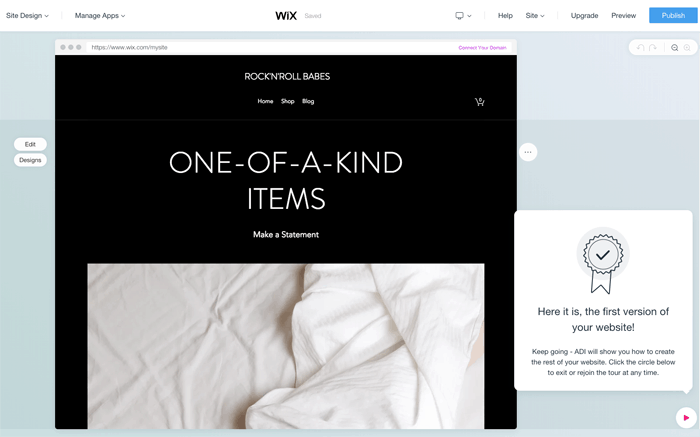
Voila! The site created for us by Wix AI
How easy is the site to edit?
It’s actually easy. Wix AI Website Builder has a little pop-up window that provides step-by-step ‘smart tips’ on what to do. But even without this, you’ll find that editing images, text and sections is pretty straightforward. Just click on the section you want to edit, and you’ll get a pop-up panel on the left that will let you edit the content. Simple.
With a little practice, even editing more complex features like store products or a blog is fairly easy to maneuver.
How much can I customize?
A lot. You can add new sections to your page, as well as moving/deleting existing ones. You also have options to add new pages such as FAQs or About Us, and apps such as live chat and booking calendars.
For each page, you can also edit SEO properties such as title, page description, and URL.
For a while, Wix AI Builder worked in a separate editor, but Wix eventually decided to integrate it into their regular (and improved) editor, so you get the best of both worlds. If you’re feeling particularly confident, you can explore the many customization options the editor has to offer. This, combined with their AI tools, will give you almost complete control over how your site looks.
Quality of designs?
As you’d expect from Wix, the designs suggested by Wix AI are attractive, modern, and mobile-responsive. And if you don’t like the design suggested for you, you can change it completely – there are plenty of different themes to choose from. Which is great, because I didn’t love the design Wix created for me – so I changed the theme to something I did like.
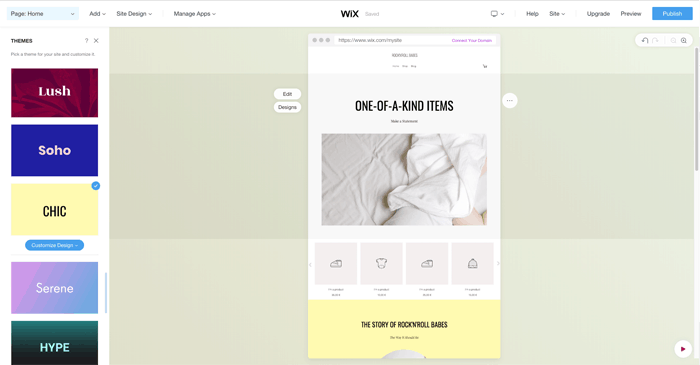
You can also customize designs with your own images, of course. Plus, Wix offers a library of its own stock photos, which you can use for free.
How ‘smart’ is the AI?
It’s not bad. If you have an existing site, Wix AI Website Builder will pull in your contact details and also suggest a color palette based on your site’s colors. But the suggested site designs seem to be mainly based on the theme you select. I don’t feel like it really analyzes your content to come up with a unique design that it thinks is best for you.
The final product, however, is pretty impressive. Here’s what I ended up with – click the image to check out the site in full.
Wix AI Website Builder Pricing:
Wix AI solution is available on all of Wix’s plans, including their free plan.
The cheapest entry-level plan for an ad-free website with your own domain is Light for $17/month.
If you want to sell goods or services through your website, you’ll need at least the Core plan for $29/month.
See full pricing details here.
Tip: Save 10% with our code TOOLTESTER10!
Rating:
4.5/5. Wix’s AI builder is complete, intuitive, flexible, and – from what I could see – blissfully bug-free. I see it as being a top choice for users who need to build slightly more complex sites – e.g. online stores, businesses sites that need booking/scheduling tools or live chat – in a short amount of time. While their AI will help you put it all together, you can truly personalize designs and edit pages and sections – which is definitely something that sets Wix apart from others.
2. Dorik
Dorik’s AI website builder stands out for offering a few extras that its competitors don’t. Aside from being able to create a customized site from scratch – complete with copy and images – Dorik also includes an AI image generator that creates photography and illustrations from just a single prompt.
It also supports language generation in any language – something I haven’t seen with many AI website builders.
Despite its relatively recent inception in 2019, Dorik clearly has a lot to offer. Its promise to ‘design a beautiful website from just a prompt’ is quite the enticing claim – but how well does it deliver?
How fast is it to set up a website?
Once you’ve registered for an account and selected the ‘Create AI website’ option, you’ll be prompted to provide your business name and a brief description of your services.
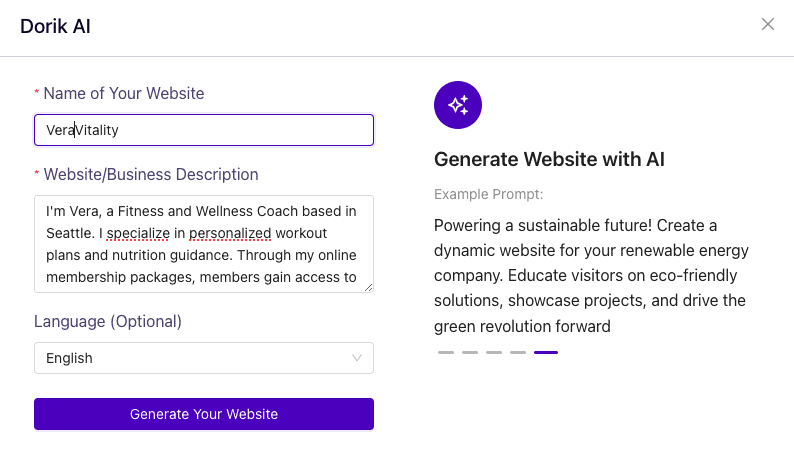
And that’s all there is to it! Within seconds, you’ll witness your website materializing before you in real-time.
It’s remarkably simple – and the end result? Not too shabby, as we’ll see in a second.
Quality of designs
The single homepage Dorik generated sported a contemporary design, vibrant hues, and relevant visuals. It wasn’t a bad place to start, although I felt that a more consistent color scheme could help to give it a more polished feel:
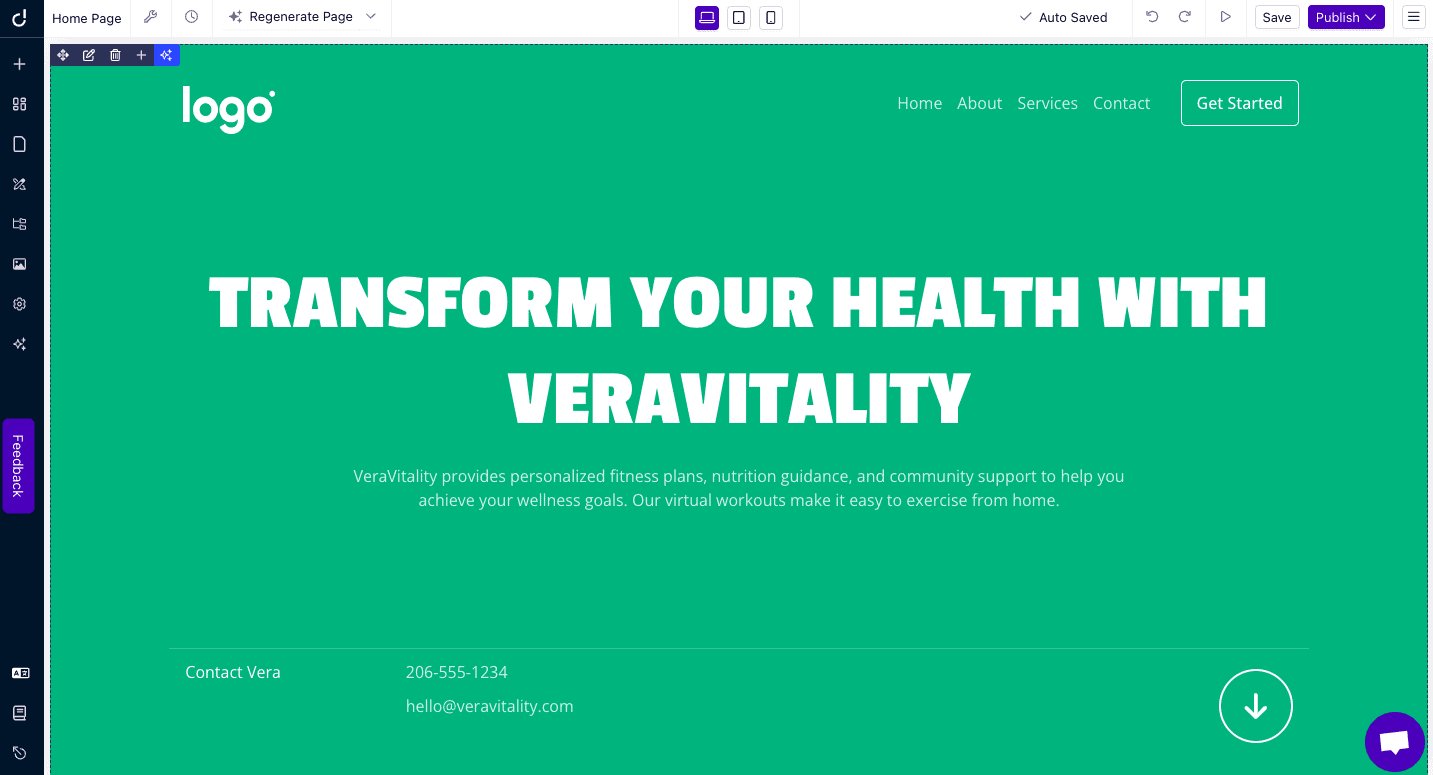
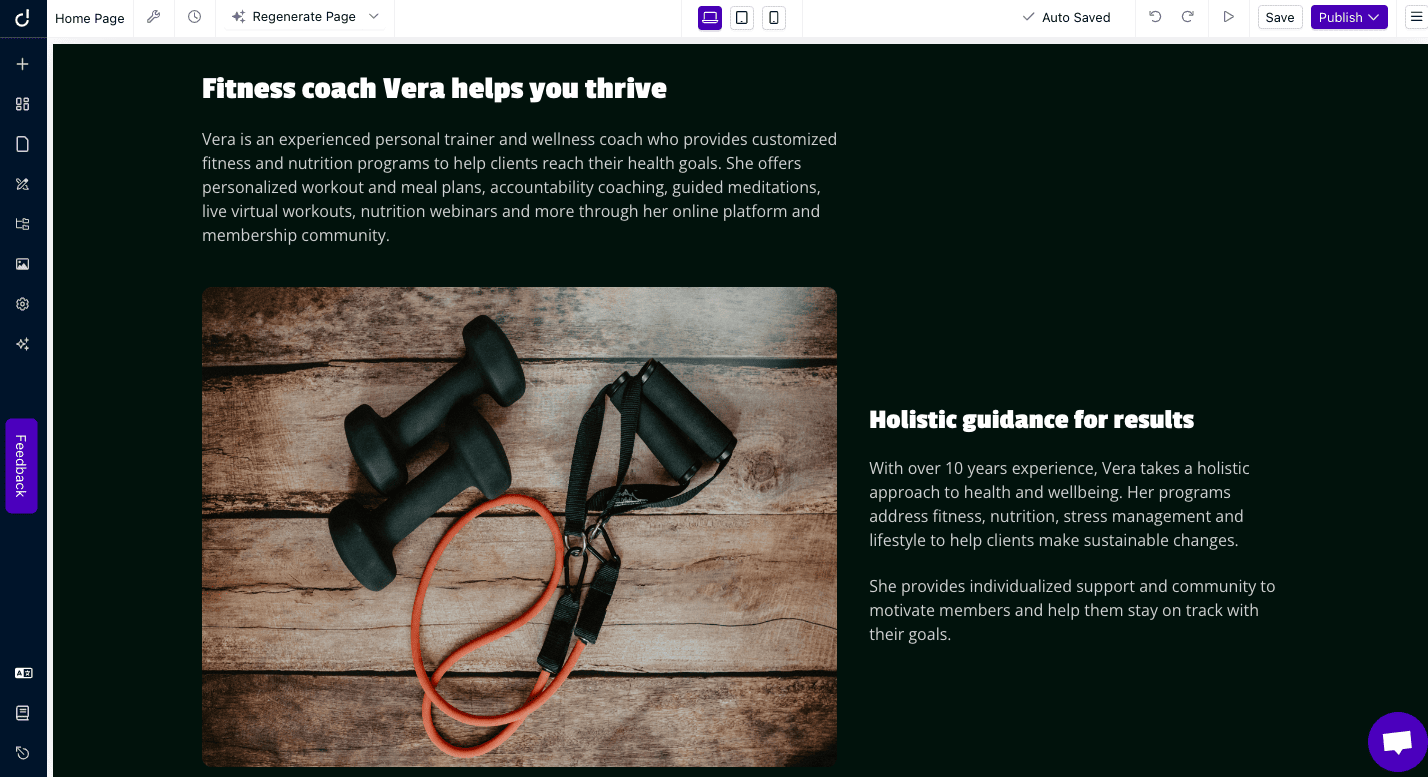
What I did like was how easy it is to switch up stylistic elements like colors and typography with the help of their ‘AI Quick Style’ feature, which is easily accessible from the left menu:
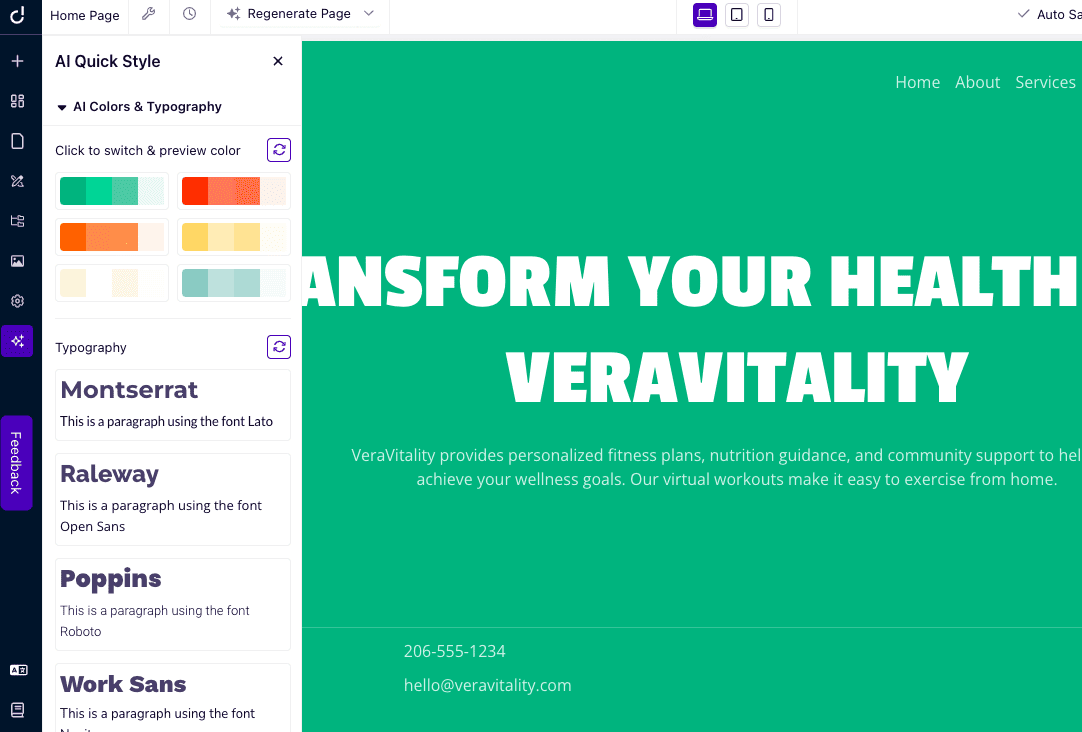
And if you’re not happy with your design, you can also hit the ‘Regenerate page’ button and re-prompt the AI with more detailed instructions on what you’re after:
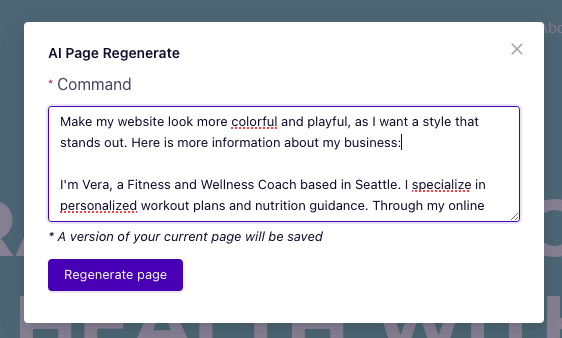
My regenerated design definitely had a more refined aesthetic, although it felt a little less customized as the images weren’t as relevant this time around:
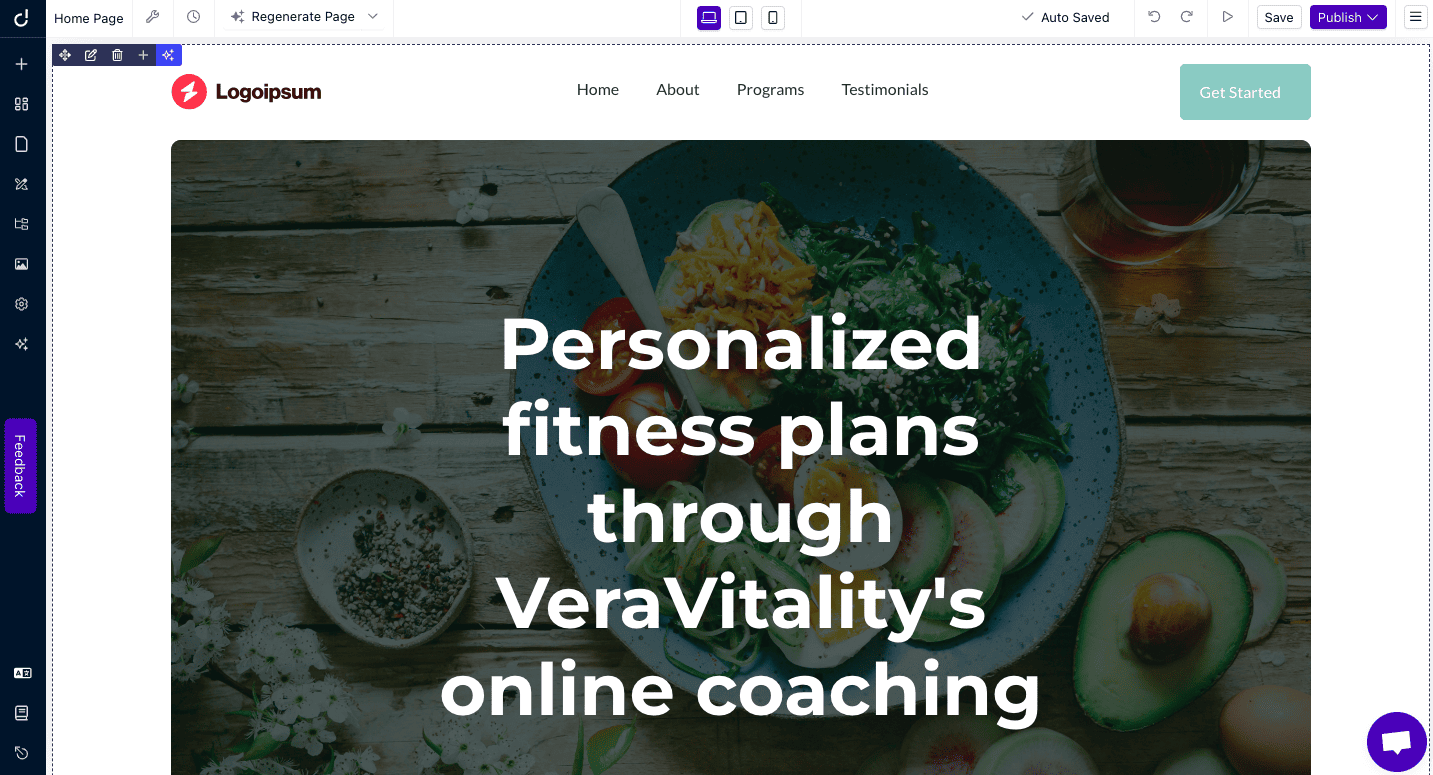
How much can I customize?
Within the Dorik platform, every facet of your generated website is open to customization, including:
- Text
- Images
- Styles
- Content elements (e.g. image sliders, lists, buttons)
- Pages
- SEO settings
- Navigation menu
The one thing I found that didn’t work perfectly was the drag-and-drop editor, which lets you move elements around, but not with the flexibility that you’d find with AI builders like Wix or Hostinger.
How ‘smart’ is the AI?
Overall, the AI is smart enough to give you almost everything you need to launch a website, with very little input.
I like that Dorik was able to take my initial description and include a section on the services I offered, complete with tailored copy and icons:
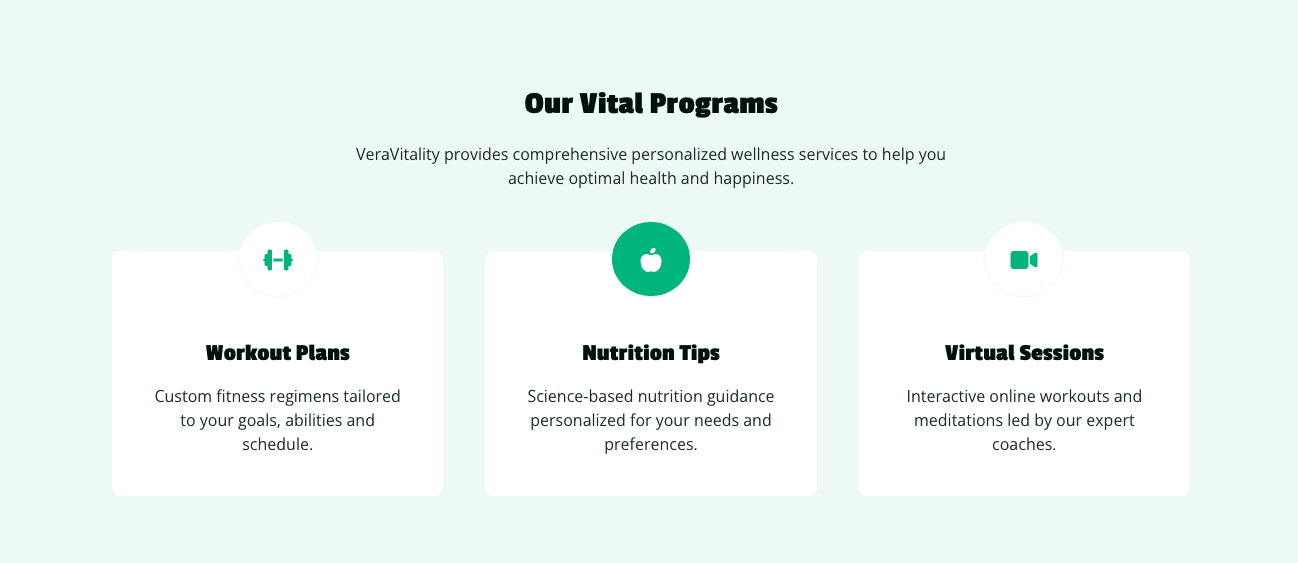
There are also some very impressive AI tools packed within Dorik’s website builder. Aside from generating all your website’s copy and design, there’s even an AI image generator that can create photography or illustrations for you with just a simple prompt:
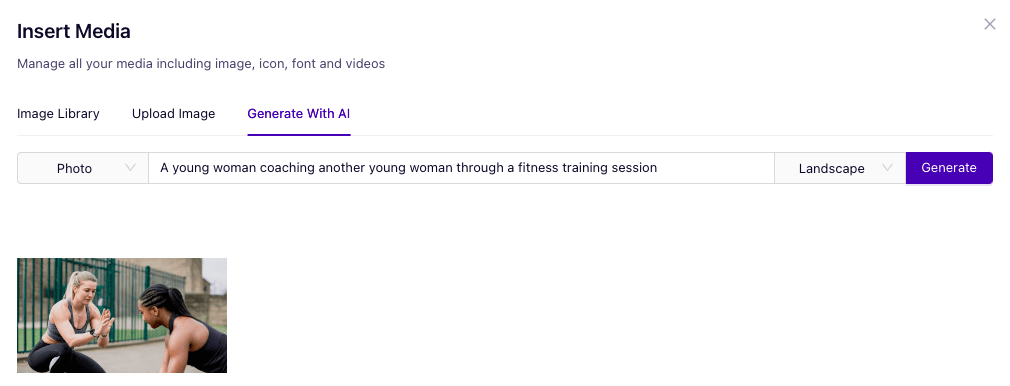
You can even use the AI to create new pages (e.g. About, Contact or Pricing pages), and regenerate page content on a section-by-section basis.
While not flawless – there were instances where it produced irrelevant content or deviated from the prompt – Dorik is a great option if you’re looking to get a decent-looking website up and running quickly.
Dorik pricing:
- Personal plan gives you unlimited websites and removes Dorik branding for $18/month, plus SEO and membership features
- Business plan adds Airtable and API integrations for $39/month
- Agency plan gives you client billing and white labelling features (custom pricing)
Rating:
4.3/5. Dorik’s AI website builder takes AI further than most, with some eye-catching results. It presents a promising option if you’re looking for a quick and user-friendly solution for website creation, with notable strengths in innovative features and ease of use, albeit with some room for refinement in design quality and customization flexibility.
Although we didn’t test them, their membership features also make Dorik an attractive option for those looking to build a membership website. However, ecommerce options are limited, so if you’re looking to build an online store, options like Wix and Shopify (both of which incorporate AI features) are better suited to this purpose.
3. Jimdo
Here’s another established website builder that’s doing some nice things with AI.
Jimdo – originally known for their super easy-to-use web builder – came out with Jimdo Dolphin in late 2017.
Why ‘Dolphin’? Well, because they wanted an AI-assisted builder that was fast, and smart. But don’t look for that name on the Jimdo website, as they mainly use it internally.
And although they were a little later to the game, it’s fair to say that they’ve quickly caught up.
So let’s take it for a spin – this time with a bakery website.
How fast is it to set up a site?
Jimdo claims to set up a site in less than 3 minutes, and honestly, this is pretty accurate. Taking a similar approach to Wix’s AI solution, you start off by answering a few simple questions about what kind of site you want to create, your business name (to pull in your Google Places listing), and whether you want to connect Facebook/Instagram properties.
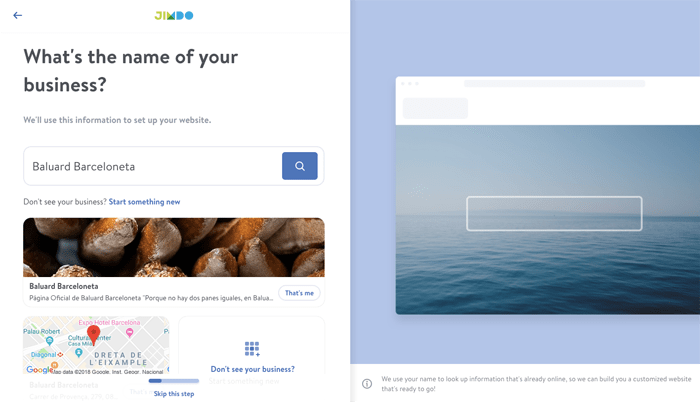
In just a few seconds, Jimdo Dolphin processes this information and generates a site that’s filled with your business name and contact details, images, and even a text description of your business/site.
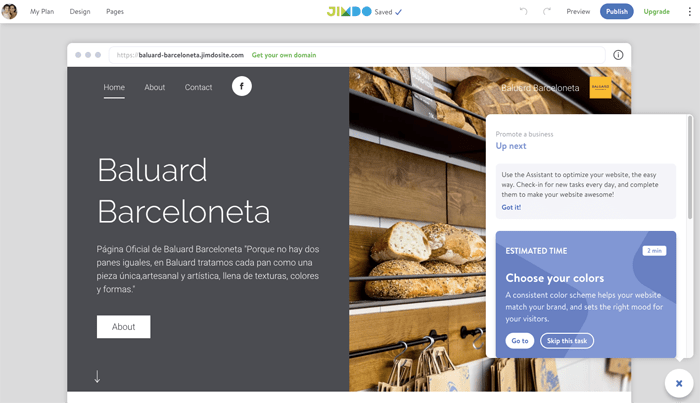
How easy is the site to edit?
Super easy. I’d go so far as to say it’s even easier than with Wix AI Website Builder. All the editing of text takes place in-line (rather than in a separate pane or window), so it’s just a matter of clicking and typing.
How much can I customize?
Quite a lot, actually. You’ve got options to change layouts of different sections (or content blocks, as Jimdo calls them), and within these blocks, of switching on/off elements (such as text, images and buttons). Blocks can be moved around and copied, and it’s also possible to add features such as contact forms, music players, and booking forms.
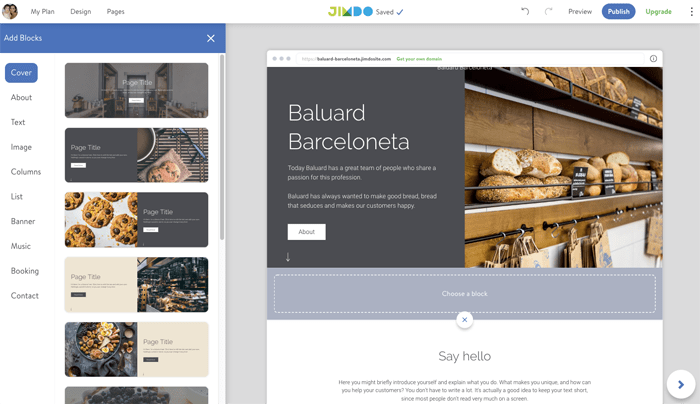
SEO options, unfortunately, are limited – you really only have the option to set a homepage title and a single title for all other pages.
Quality of designs?
Not only can you switch designs/themes, but you can also edit styles within designs. This includes color themes, fonts, and even adding animations. All designs are mobile-responsive, too.
How ‘smart’ is the AI?
It’s intelligent enough to suggest relevant site colors, and also pull in any high-quality images you may have on your online properties (e.g. social media and Google Places), which is a huge bonus. It also adds a business description to your site taken from social media.
I actually really liked the design Jimdo Dolphin created for me, so made very few changes to it. Check out the final site here.
Jimdo pricing:
- The free PLAY plan gives you up to 5 subpages
- The START plan (up to 10 subpages) starts at $11/month
- The GROW plan for more storage and up to 50 pages at $17/month
- The UNLIMITED plan for unlimited pages $45/month
Plans are billed annually. Find out more about Jimdo’s pricing.
Rating:
4/5. The ease of use and quality of designs are impressive. But Jimdo Dolphin would definitely score higher if it gave us more options for website types (e.g. online stores, blogs), SEO, and let us switch over to the more advanced Jimdo Creator editor. As it is, we think it’s suitable for simple business websites, portfolios, and businesses that take online bookings (e.g. beauty services, yoga studios). Prices are generally lower than Wix’s, but do keep the page limits in mind.
4. GoDaddy
We’ve been keeping tabs on GoDaddy for several years and have observed their tendency to frequently overhaul their platform – specifically, launching a brand-new version of their website builder every so often. Therefore, it’s hardly surprising that their most recent update features an AI-powered website builder.
One of GoDaddy Website Builder’s strongest suits has been how well it integrates marketing features such as a social media manager, marketing calendar, digital ads, and email marketing. So, let’s see if that continues with its AI builder.
How fast is it to set up a website?
After creating an account with GoDaddy, you’ll be asked a series of questions, starting with the main goals for your site (sell goods and services, take online appointments, start a basic website etc). You’ll also be asked about your sales channels (if relevant), current sales revenue, your industry, and business details:
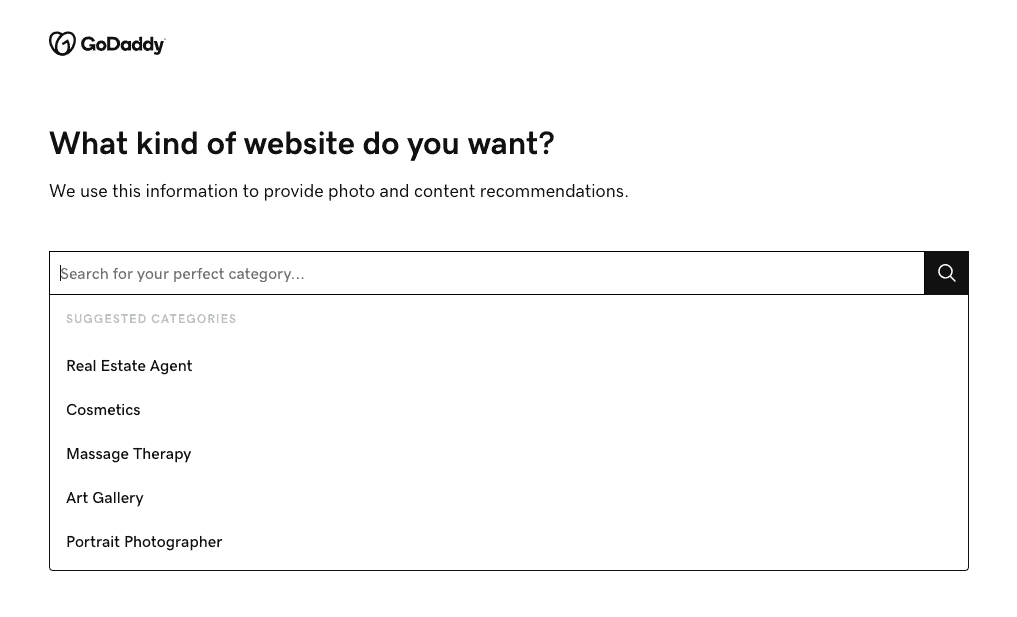
Within a few seconds, you’ll have a fully developed website, complete with design elements and text that are specialized for your industry:
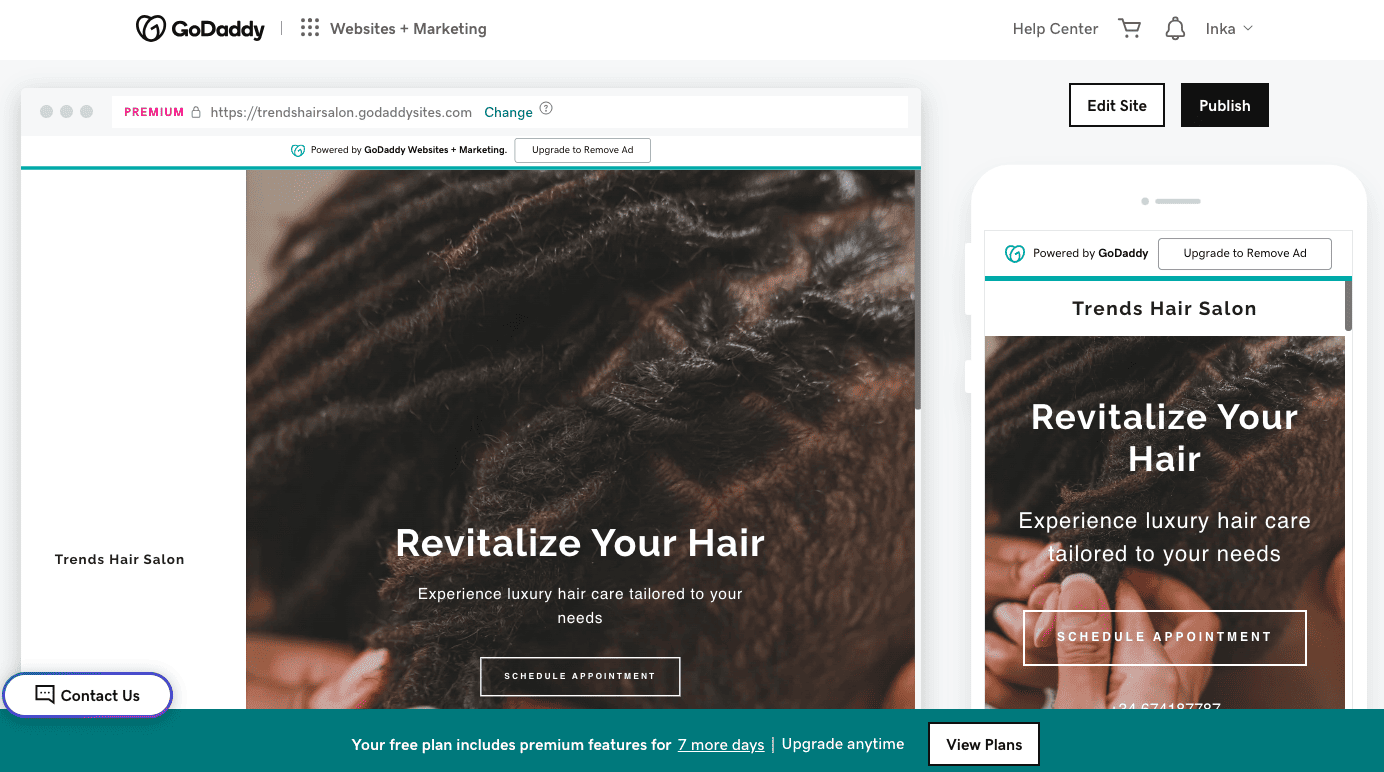
Quality of designs?
The overall look and feel of the suggested design felt pretty modern, and it’s great that they showed you a preview of both your desktop and mobile site. Once you hit ‘Edit site’, you’ll be taken on a quick tour of the editor so you can see how to adjust colors, fonts, and content.
If you’re not entirely satisfied with the suggested design, you have the option to click the ‘Try a new look’ button. This allows you to explore various templates, all while retaining your existing images and text:
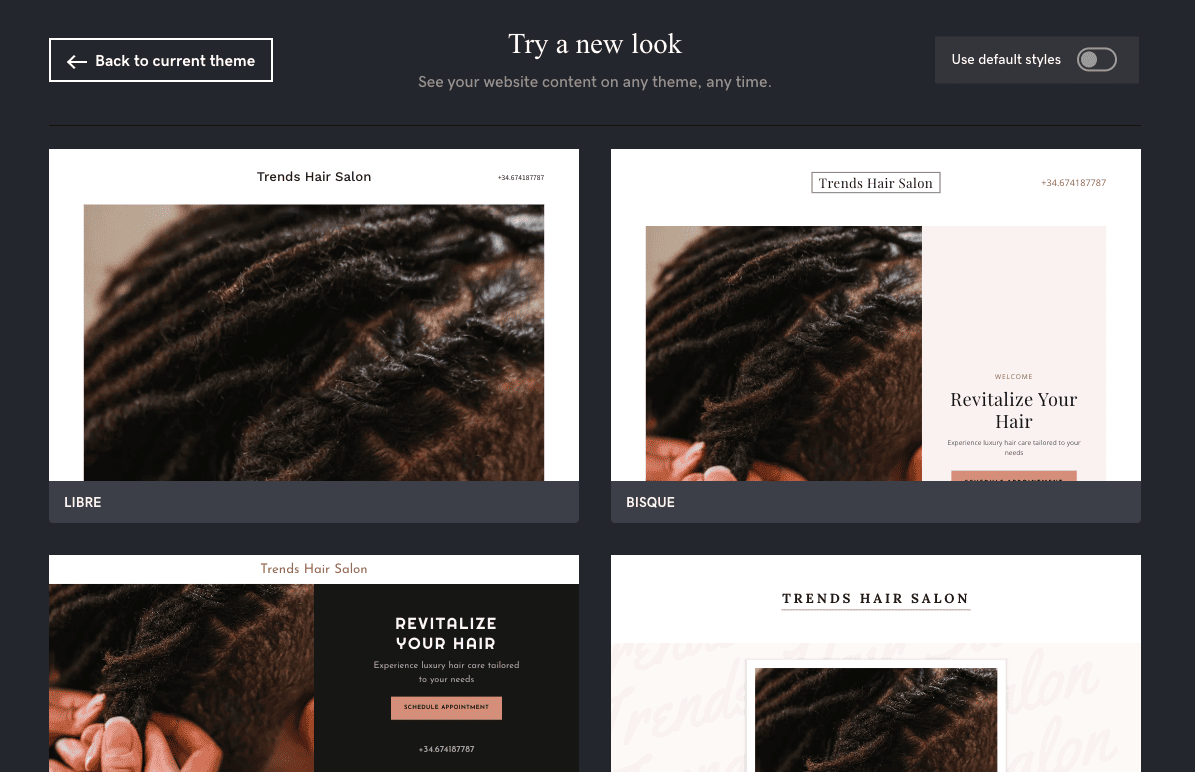
How much can I customize?
GoDaddy’s editor is flexible enough to let you:
- Add new pages (such as a Contact or About page)
- Customize SEO settings
- Change images and edit copy
- Insert new page sections and features (GoDaddy gives you a huge range of options to choose from, including galleries, menus, price lists, and appointment bookers):
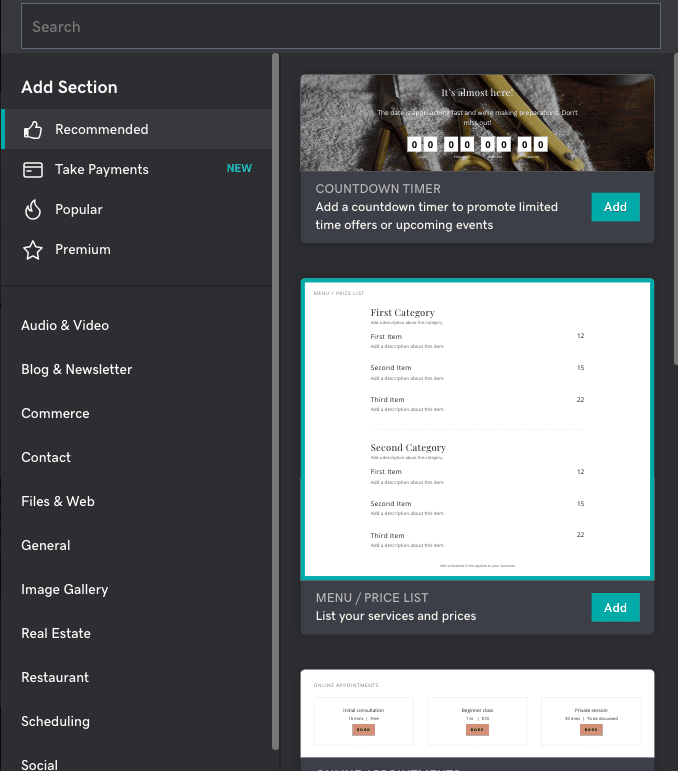
Changing images on your site is super easy. You can upload your own photos, grab some from Instagram or Facebook, or even select from GoDaddy’s own stock image gallery. Just a note though – the stock images do have that typical ‘stock photo’ feel, so I’d suggest going with your own if you can:

Even though the editor isn’t a full-fledged drag-and-drop tool, it’s still user-friendly enough for straightforward modifications. If you prefer working within a structured template rather than having to decide on layouts and aesthetics yourself, you might actually find this setup more to your liking:
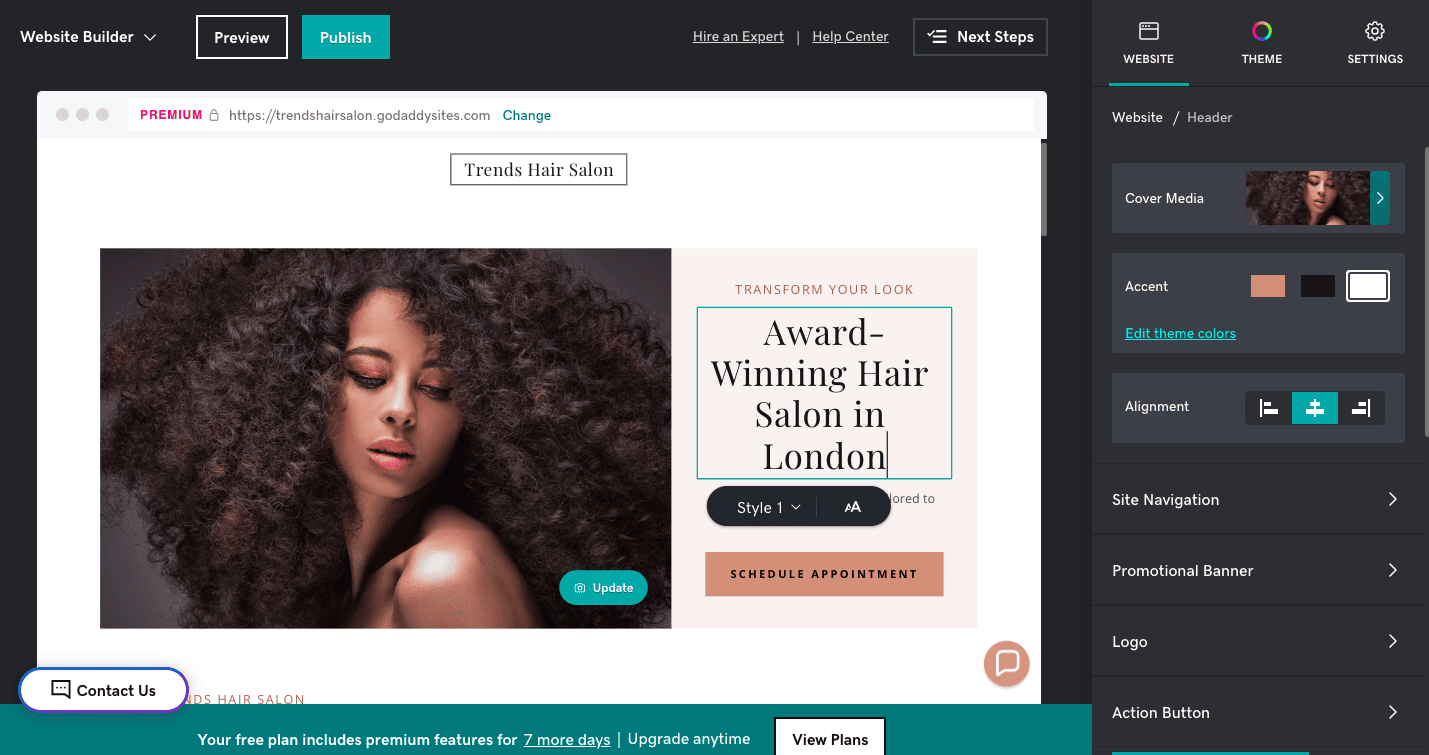
How ‘smart’ is the AI?
GoDaddy’s AI generates a complete website for you, including the design, images, and text. Overall, I found that the images and content aligned quite well with my specified industry. You can also ask it to generate alternative suggestions if you don’t like what it comes up with. However, I’d suggest making some adjustments to give it a more personalized touch and avoid sounding too generic:
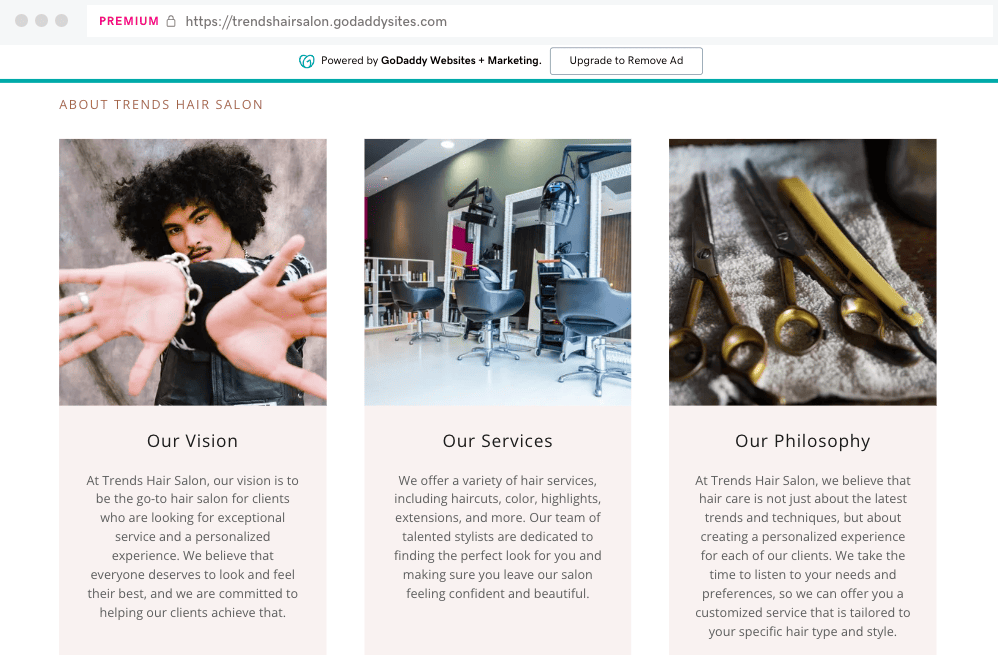
GoDaddy also automatically inserts features it thinks will be relevant, such as a map if you have a physical location, client testimonials pulled from Facebook, and a chat widget:
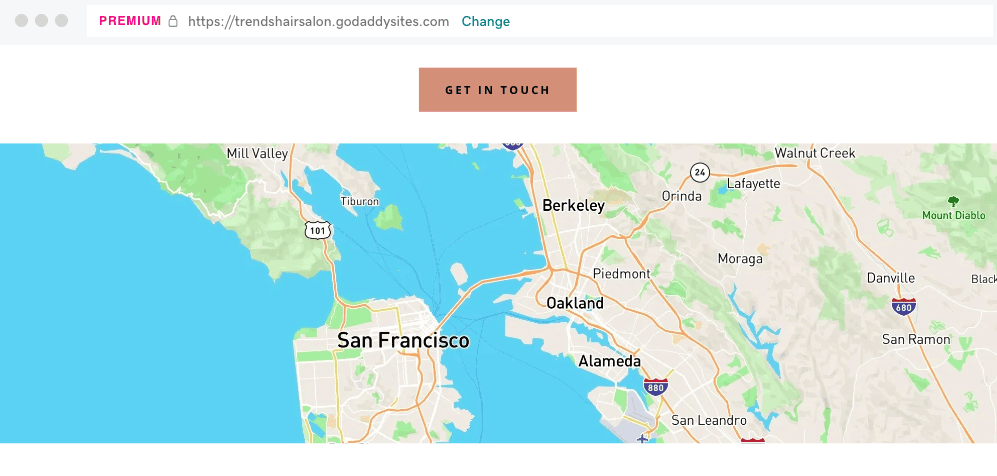
Thankfully, you also still get access to all of GoDaddy’s marketing features, such as a marketing calendar and social media content creator.
GoDaddy pricing
GoDaddy’s website builder starts at $16.99 per month for the Basic plan, which lets you use your own domain name and removes GoDaddy’s branding. To sell online or accept online appointments, you can upgrade to one of the Commerce plans, which start at $34.99.
A free plan is also available, letting you publish an ad-supported website with a GoDaddy subdomain.
Rating:
4/5. All in all, GoDaddy’s AI website builder is pretty handy. Answer a few questions and you’re well on your way to having a full website. The designs and text are good, and you’ve got some freedom to tweak things as you see fit. I particularly like that you can pull in images from social media – nice touch. But being able to pull in more from your existing branding would be great, as would the ability to fine-tune the tone of your content instead of just flipping through their pre-set options. Overall, it’s a strong choice that could become even better with a few enhancements.
5. Durable
Durable piqued my interest with its promise of crafting a website in just 30 seconds through its AI website builder.
But it doesn’t stop there – it also features an AI-powered admin assistant and blog writer. Throw in a CRM and invoice manager, and you’ve got yourself a robust set of tools for handling key daily business operations.
Now, let’s dive into how effective its website builder actually is.
How fast is it to set up a website?
With just 3 questions asked during the initial set-up process, the 30-second promise actually doesn’t seem too far-fetched – especially considering that you can jump straight in without creating an account. Instead, you’re simply asked for your industry, location, and business name. It even provides some suggestions if you’re starting from scratch and don’t have a business name in mind:
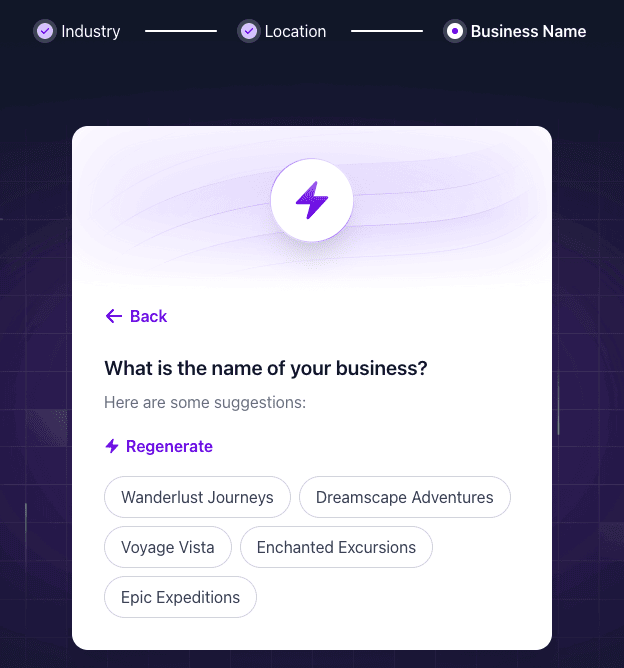
A few seconds later, you’ll have your website design, complete with relevant images, text, and pages, all ready to customize.
Quality of designs?
Durable gives you quite a few options to change up your site – which is just as well, because their initial design didn’t exactly give off the tropical vibes I had in mind for my fictitious travel agency website:
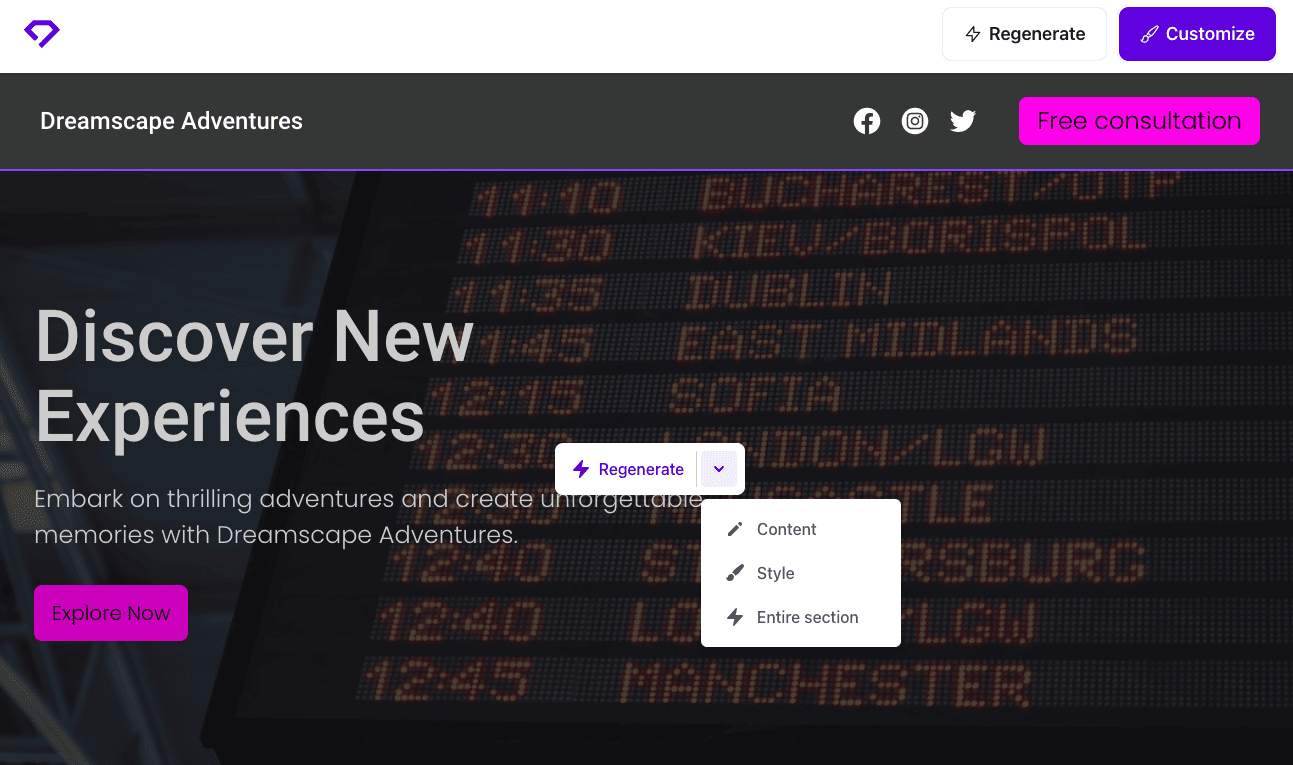
You have the option to click ‘Regenerate’ for an entirely new design, or you can update it section-by-section if you’re happy with the overall look but want to tweak a specific part. You can also choose to refresh just the copy, the style elements (images, colors, and fonts), or both. After cycling through several ‘Regenerations,’ I ultimately landed on a design that was closer to what I had in mind:

How much can I customize?
Up until this stage, there’s no need to create an account. But once you click on the ‘Customize’ button to make adjustments, you’ll be prompted to sign up. The upside is that you can take advantage of a free 90-day trial, and you’re only required to pay when you decide to publish your website.
You’ll then be taken to the editor, where you can edit your existing images and text, add new sections, and even add new pages:
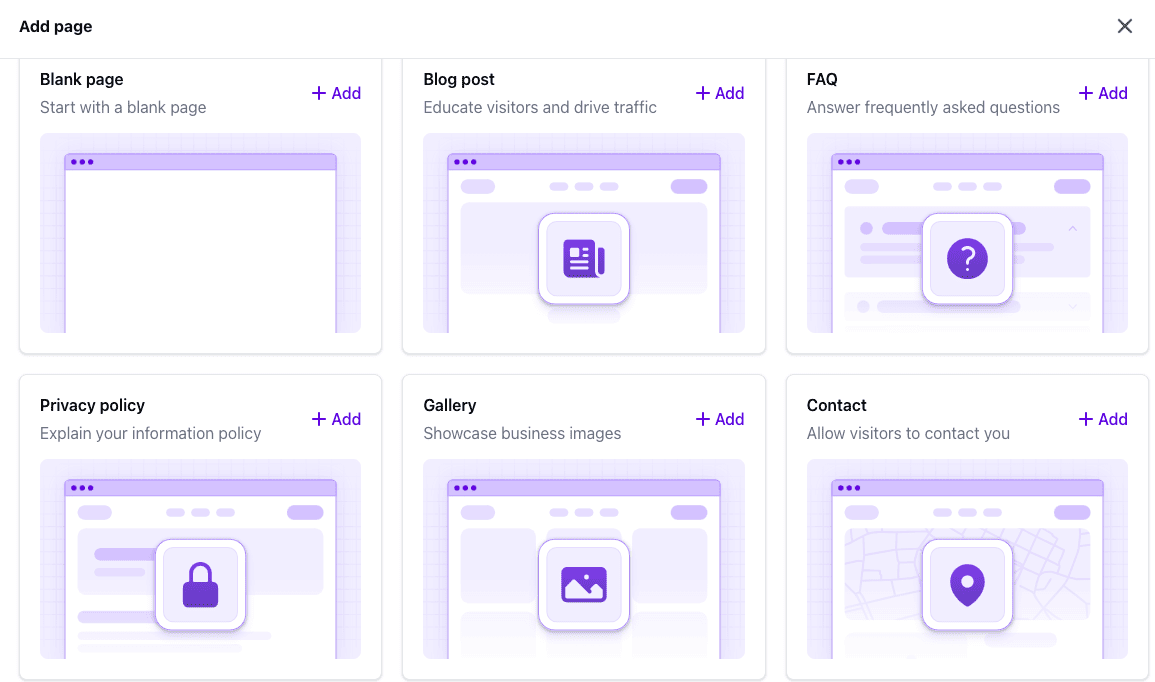
If you’re not overly concerned with having complete control over your website’s design, Durable offers a perfectly adequate solution for editing your site. However, you won’t get the full drag-and-drop flexibility that you do with website builders like Wix or Hostinger.
How ‘smart’ is the AI?
Like GoDaddy, Durable is one of the few AI website builders I’ve come across that really tailors a website to your niche. It not only suggests an eye-catching design – complete with relevant images – but also generates website copy that actually isn’t half bad:

Not only that – it also inserts sections it thinks will be useful, such as a contact form, and products/services:

Sure, the quality isn’t perfect. As I pointed out earlier, the initial design fell short of being perfect, and the text could use some refining. However, it serves as a solid jumping-off point and can be a real time-saver when you’re in need of creative inspiration.
I also liked that there’s an “Ask me anything”-type AI assistant that’s easily accessible from the editor, to help you carry out various tasks:
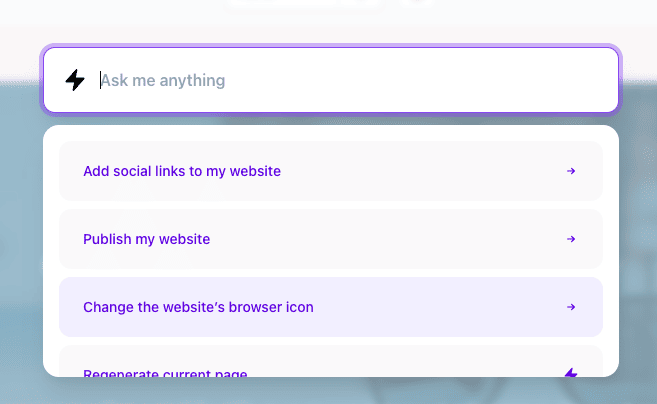
One of these tasks includes crafting blog articles from scratch. Durable can even suggest a few article ideas to get started with:

Just a heads-up, though – the AI assistant isn’t totally foolproof. When I asked for help with my SEO settings, it didn’t really point me in the right direction. So, it seems to do better with the options it already knows about, rather than tackling open-ended questions.
Durable pricing:
Durable’s Starter plan is an affordable $12/month (charged annually), and includes a custom domain name, unlimited storage, and 50 contacts in the CRM (yes, it even features a customer database).
The Business plan costs $20/month and adds priority support, unlimited contacts, and unlimited AI-generated promotions.
While Durable isn’t built for ecommerce, there are workarounds that allow you to sell products from a Durable site.
Rating:
3.9/5. Durable’s AI website builder stands out for its speed and minimalistic approach, helping you launch a website with little effort. Its focus on niche-specific design and content further streamlines the site creation process. The AI assistant and blog creator are also useful additions. However, it would be nice to see the AI assistant work a little smarter, and to have an option to adjust the tone of your site (e.g. playful or professional) to better align with your brand vision.
6. Hostinger Website Builder
In just a few short years, Hostinger Website Builder (previously called Zyro) has made quite a name for itself in the website-building niche.
Offering a low-cost alternative to the likes of Wix and Squarespace, Hostinger’s website builder offers stunning templates and comes packed with features.
Among them, a whole suite of AI-powered tools – including an image AI generator, text writer, blog generator, heatmaps, SEO tools, and more. However, it’s worth noting that all of these tools, except for the AI website builder, are only available with the higher plan.
But of course, we’re most interested in Hostinger’s AI website builder. So let’s check it out.
How fast is it to set up a website?
Relatively fast, although there are a few small hurdles. You can use the 7-day trial period, but creating a free website, forever, is not possible. It’s not the best user experience, but at least it’s affordable (and there’s a 30-day money-back guarantee).
After having to click through several screens, you’ll get offered the option to create a new website, and can choose to build it with the AI website builder, or start with one of their pre-made templates.
Let’s go the AI route.
You’ll just need to give your website a name and add a little description to explain what it’s about. Then, you can decide if you want to set it up for selling online too.
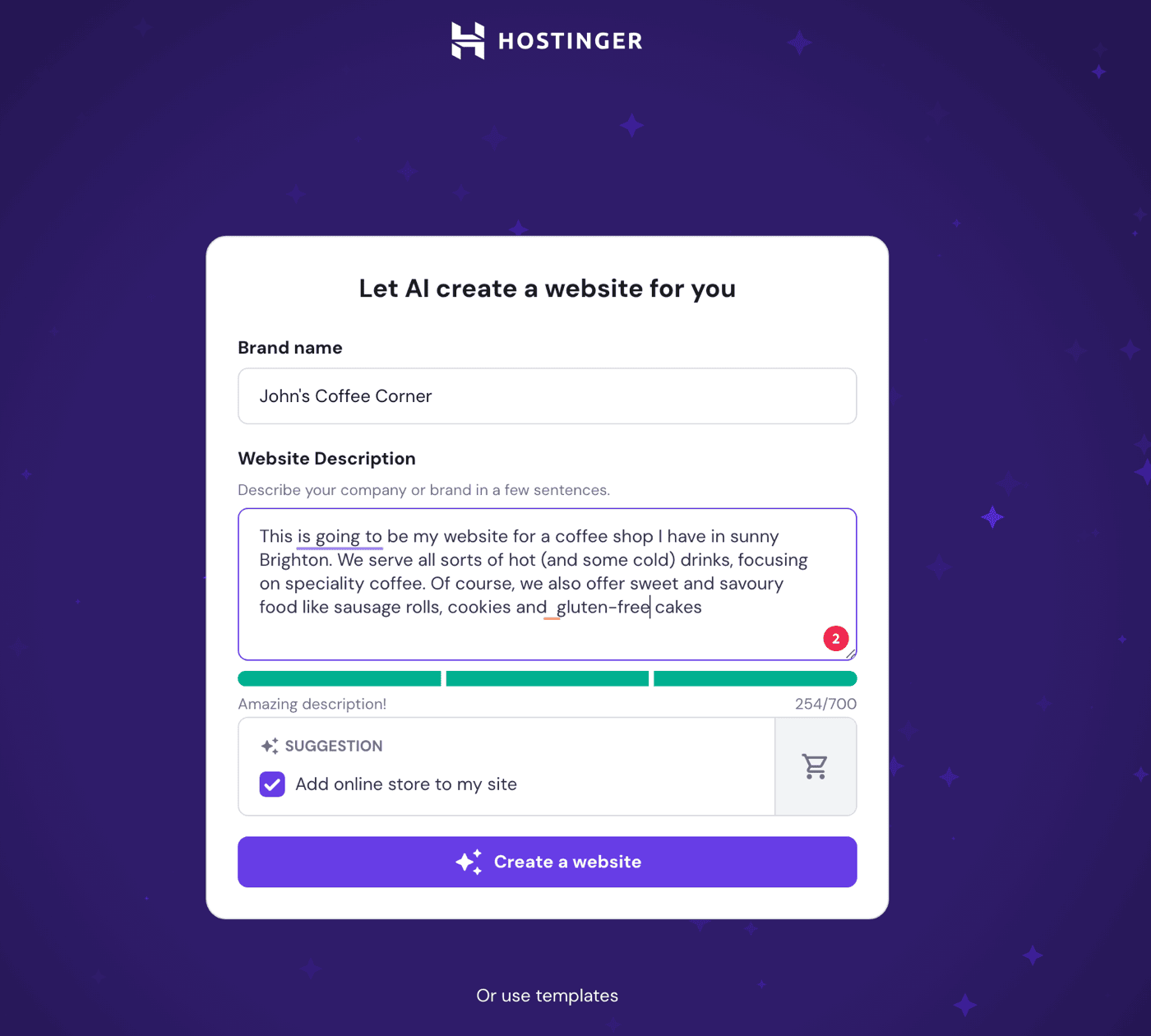
The AI generator will present you with a design and a few color palettes that you can edit. However, if you’re not happy with it, you can always ask their AI to generate a new design.
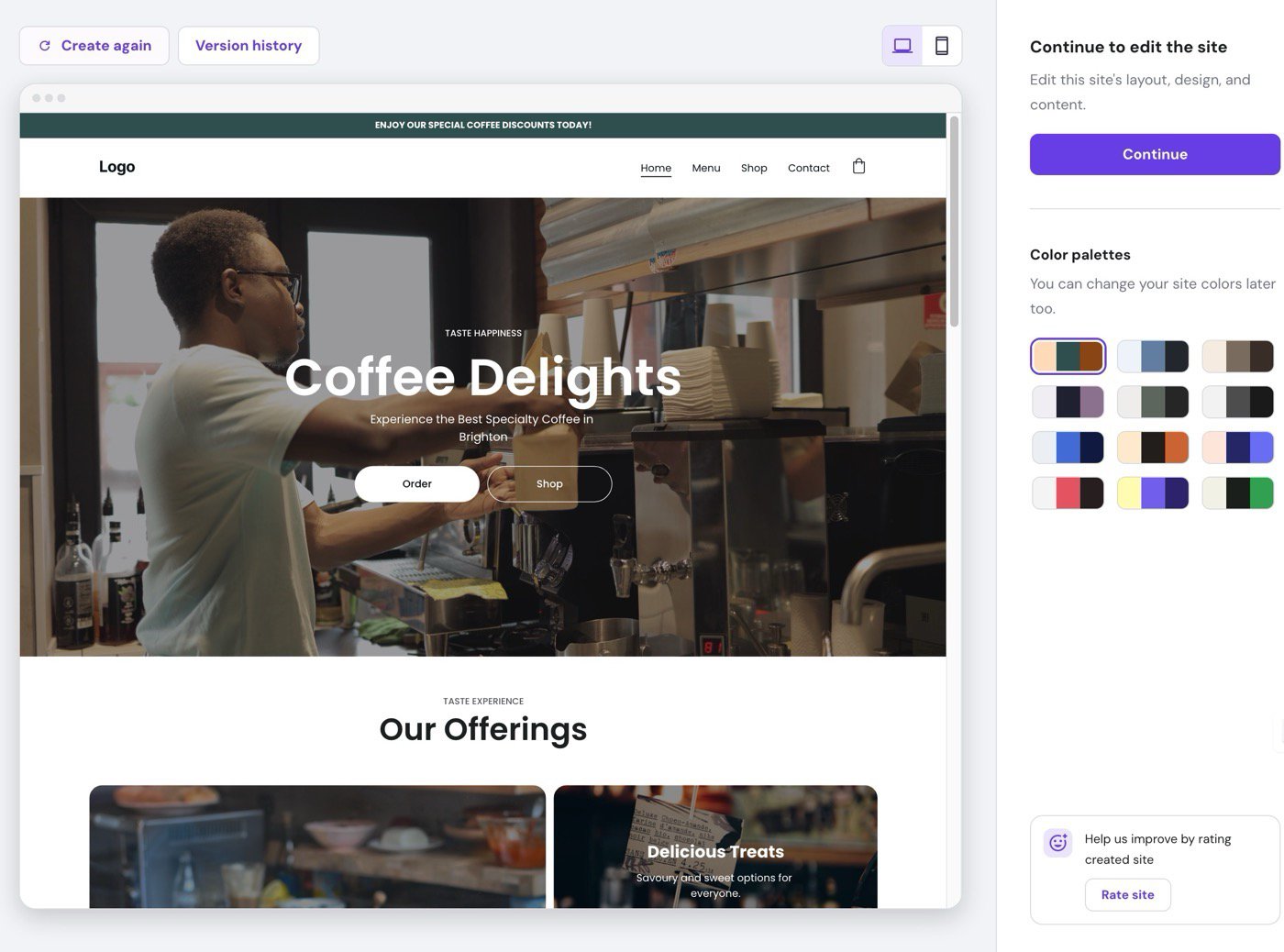
Once you are set to go, simply hit Continue in the top right, and you’ll be taken to the website editor to customize your design.
How much can I customize?
Here’s where Hostinger Website Builder really sets itself apart from other AI website builders.
Instead of a stripped-down version of the website editor, you’ll have access to the complete editor – that is, the very same one you’d use if you were creating a site from scratch, or from a template.
That’s a big deal, because you’ll be able to customize your website without any constraints.
And, as Hostinger Website Builder is a fully drag-and-drop editor, you’ll have control over what content is included, and where it’s placed:
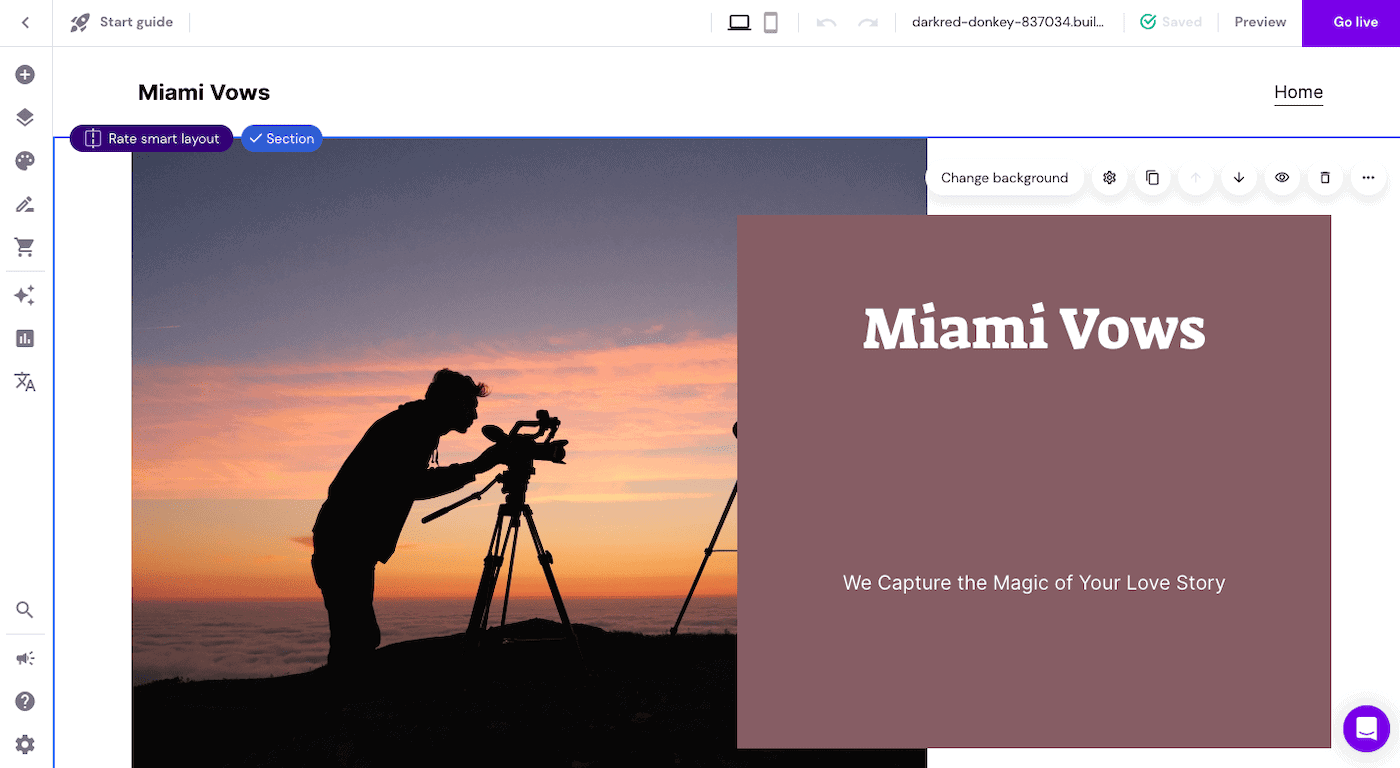
It’s also possible to add new sections to your pages, with a huge list of pre-built layouts to choose from:
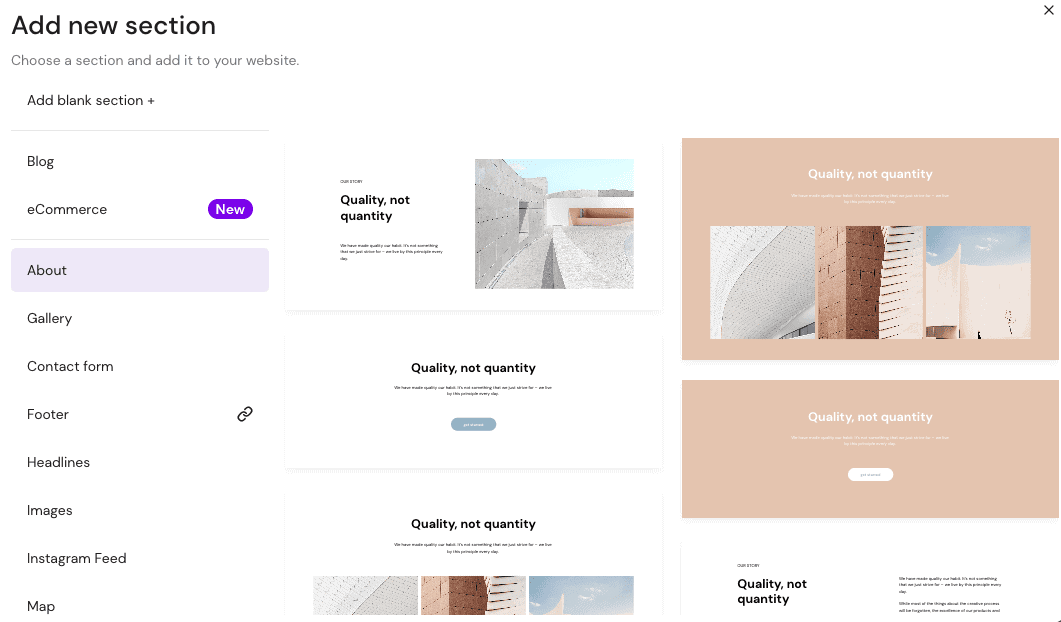
As I mentioned before, there’s also the possibility of adding a blog and an online store, extending your website’s capabilities even further.
So, not bad for an “AI” website builder (keep reading to see why I’m a little skeptical of that self-styled title!).
Quality of designs?
Here’s where I felt things could’ve been a bit better. While Hostinger’s regular website editor has some really nice templates, the designs offered by the AI builder weren’t perfect. They felt a bit… well, artificial.
And as I mentioned earlier, I did have to hit that “Create again” button several times before I found something that I was moderately happy with.
How ‘smart’ is the AI?
If I’m being honest, I was a little disappointed with the AI element. Sure, it gave me a modern-looking design within a matter of seconds. But it all still felt a bit generic—especially the images and the lack of personalized text for the website.
However, I did like that it suggests some text for you to use, which can help if you need some inspiration on what to write:
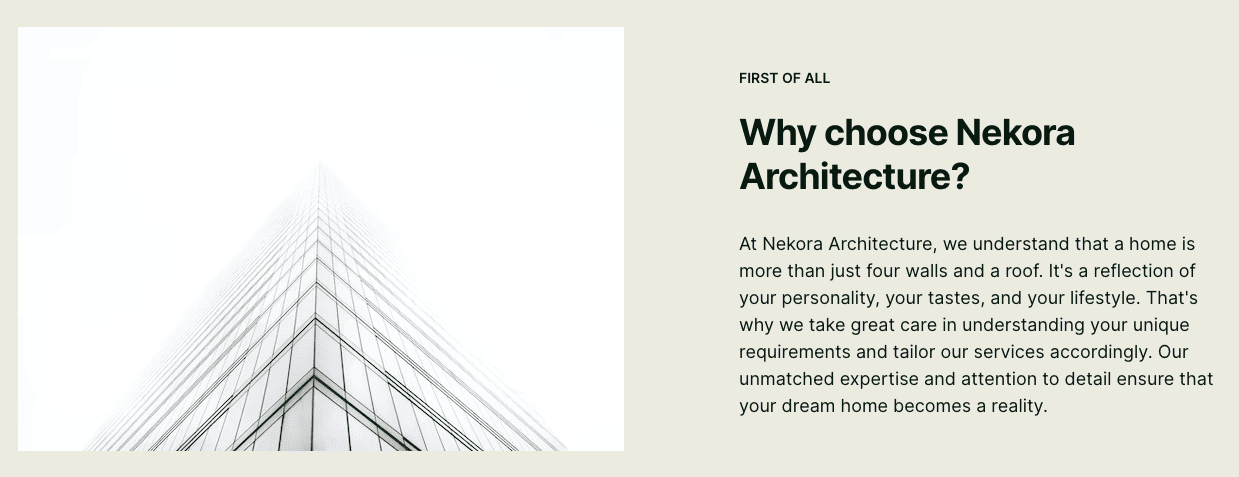
Overall, it felt less like an AI-powered website builder, and more like a website builder that simply helps you shortcut a few steps (choosing your template, inserting pages and features, etc.).
I got a similar impression with their other AI tools. The AI heatmap, which is supposed to show you areas of your pages that are likely to get viewed more, seemed to be based on general design principles rather than a deep analysis of your website.
But, if you’re pressed for time – or inspiration – then Hostinger’s AI tools can be a good starting point. Just don’t expect it to create your whole website for you.
Hostinger Website Builder prices
- No free plan available. Unfortunately, you need to first purchase a plan in order to try the website out, although there is a 7-day money-back guarantee
- The Premium paid plan costs 7,99€ per month for unlimited bandwidth, 24/7 customer support and free emails. If you need ecommerce features, you’ll have to purchase the Business plan at 9,99€ a month (for 12-month contracts). It’s also possible to build multiple websites (up to 100).
Rating:
3.8/5. The final product tends to look pretty polished, and a bit generic. But the impact of the AI feels pretty minimal. We’d love to see Hostinger Website Builder pull in information from existing websites and social profiles, for example, and suggest designs and images that are more niche-specific. Overall, the AI builder offers a useful starting point for new websites, but isn’t overly helpful for existing brands and businesses.
> Try Hostinger Website Builder
7. 10Web AI Builder
At Tooltester.com, we often get users asking if they can easily migrate their Wix or Squarespace site to WordPress.
Sadly, our answer is usually no – there’s no simple way to do this.
However, 10Web claims to have solved this problem with its AI Builder.
With just the URL of your existing website, 10Web says it can recreate your site in WordPress within minutes.
It does this with the help of the Elementor website builder, a plugin for WordPress that lets you edit your site within a visual editor.
What’s more, 10Web also recently introduced a more conventional AI website builder that builds you a WordPress website from scratch, as well as an AI assistant to help you generate content.
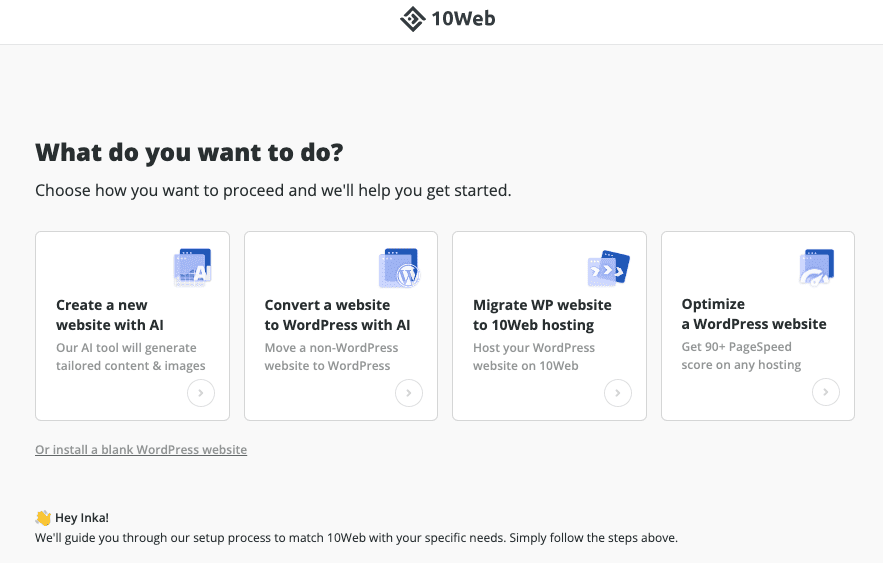
I decided to test both options for building a website – import from an existing site, and build a brand-new site. Let’s start with the first option.
Option 1: Import existing site to WordPress
How fast is it to set up a site?
Here, I have to say I was pretty impressed. They weren’t kidding – it took less than a minute for 10Web to import the design of my existing site into its builder.
All I had to do was copy and paste in the URL. In this case, I used our own Tooltester company website, which is built on Wix.
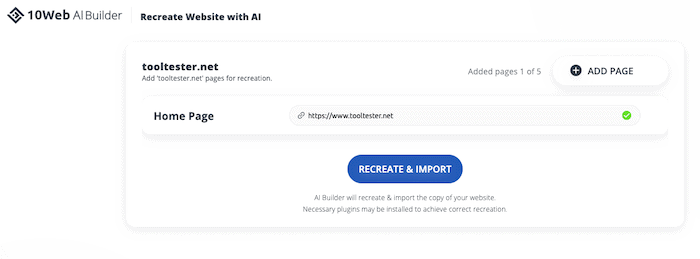
The tool also lets you import five pages at the same time, so in addition to the homepage, I selected our blog summary page, and one blog article.
Less than a minute later, 10Web had replicated the website within its builder – layout, images, text, and links were all there.
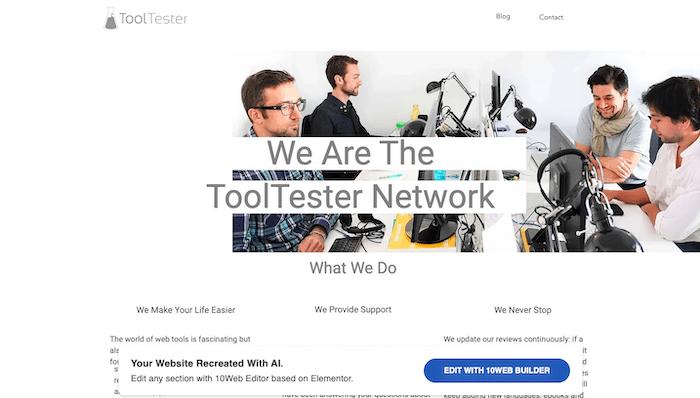
Of course, the formatting (as you can see) wasn’t 100% perfect – which is where the next step comes in handy.
But, by automatically copying over all the content from my existing site, I do have to admit that it saved me a lot of time.
How much can I customize?
While 10Web takes care of the AI-powered import of your site, the customization takes place within the Elementor website builder (white labelled as the 10Web Builder).
If you’re not familiar with Elementor, it looks a lot like many other visual website builders, with a click-to-edit text editor, and content blocks that you can drag and drop into your pages.
Because there are so many things you can customize (content, styles, positioning etc), the editor can take a little bit of getting used to.
But, that’s a small trade-off for having so much control over your site’s design. In fact, it offers a lot more flexibility than most of the AI builders on this list.
With the editor, I was able to take this:
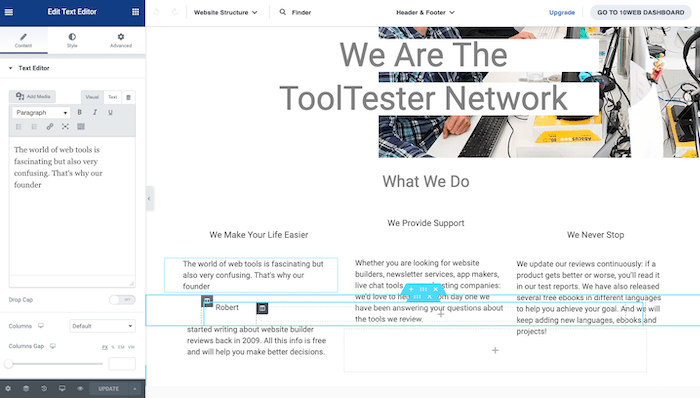
And turn it into this:
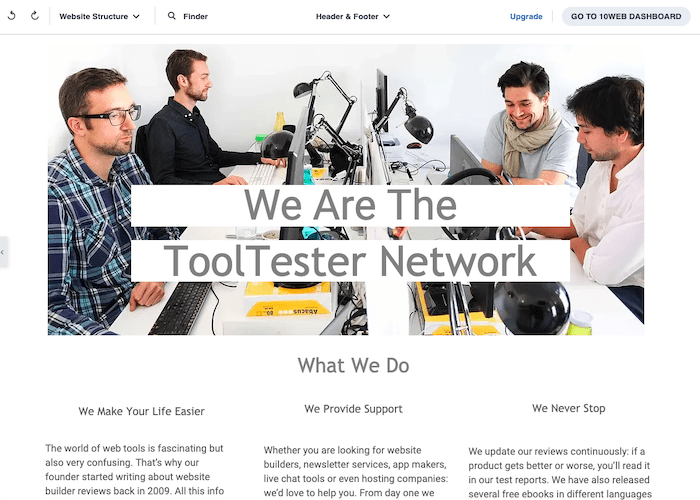
Quality of designs?
Unlike the other AI website builders we’ve looked at, 10Web replicates the design of your existing website, rather than generating a brand new one for you.
How true is it to the original design? I have to say, I was pretty impressed. Apart from a few formatting and font issues (that were easily fixed), 10Web copied over layouts, images, background colors and font colors surprisingly well.
Even sections with slightly more complicated layouts (with image, text and buttons) seemed to be carried over seamlessly:
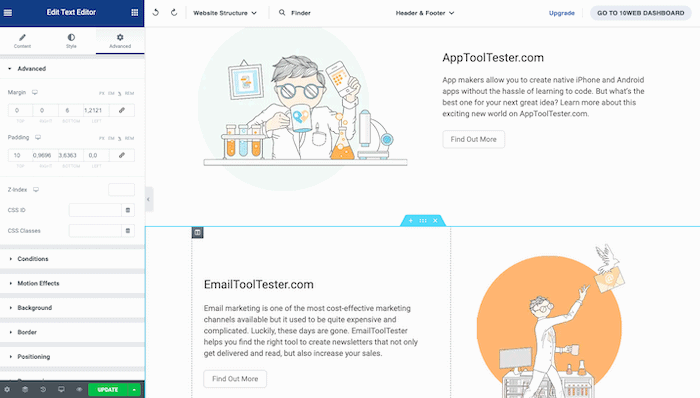
That was true not just for the homepage, but for the other pages I imported too – they looked pretty spot-on:
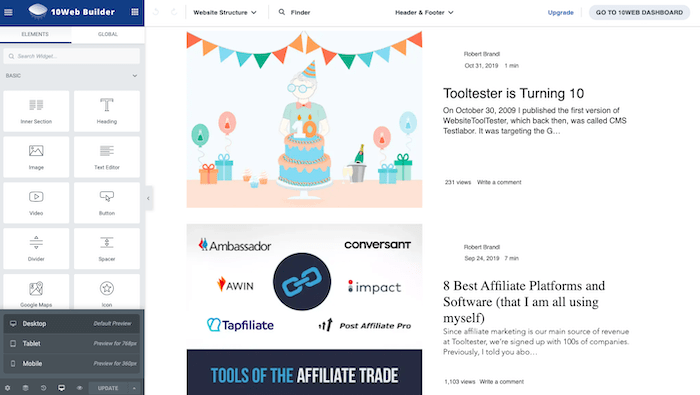
Pages were also mostly mobile-responsive, which was another big timesaver:
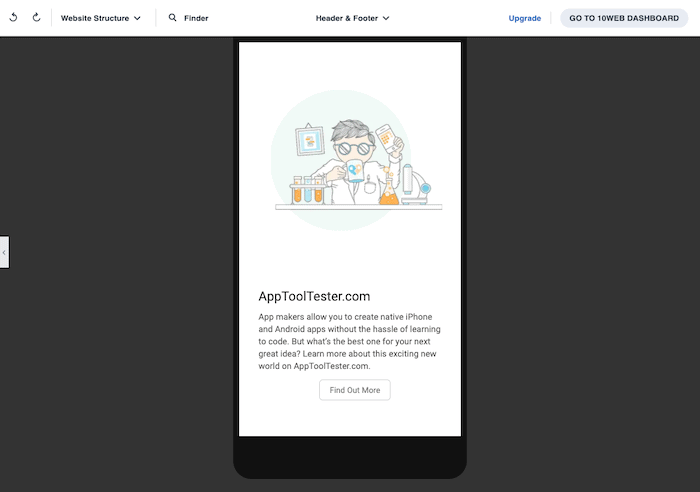
It’s worth noting that, if you want to build a brand new site, the 10Web Builder does offer a handful of templates to help you get started. These are separate to the AI builder though, and so weren’t tested in this review.
How ‘smart’ is the AI?
Overall, pretty good. As I’ve mentioned, it carries over most of the content from an existing site without issue, although I have to admit that the original site I used was pretty light in content. I’m not sure how it would handle a bigger or more complex site.
As the formatting didn’t come across perfectly on the homepage, I did have to make quite a few manual changes. Curiously, some fonts carried over while others didn’t – another thing that required a manual fix.
Option 2: Build a site from scratch
How fast is it to set up a site?
Unfortunately, the setup process for this option wasn’t quite as smooth. The builder guides you through a series of 5 questions that are simple enough to answer (business name, industry, services, informal vs formal tone of voice, etc.):
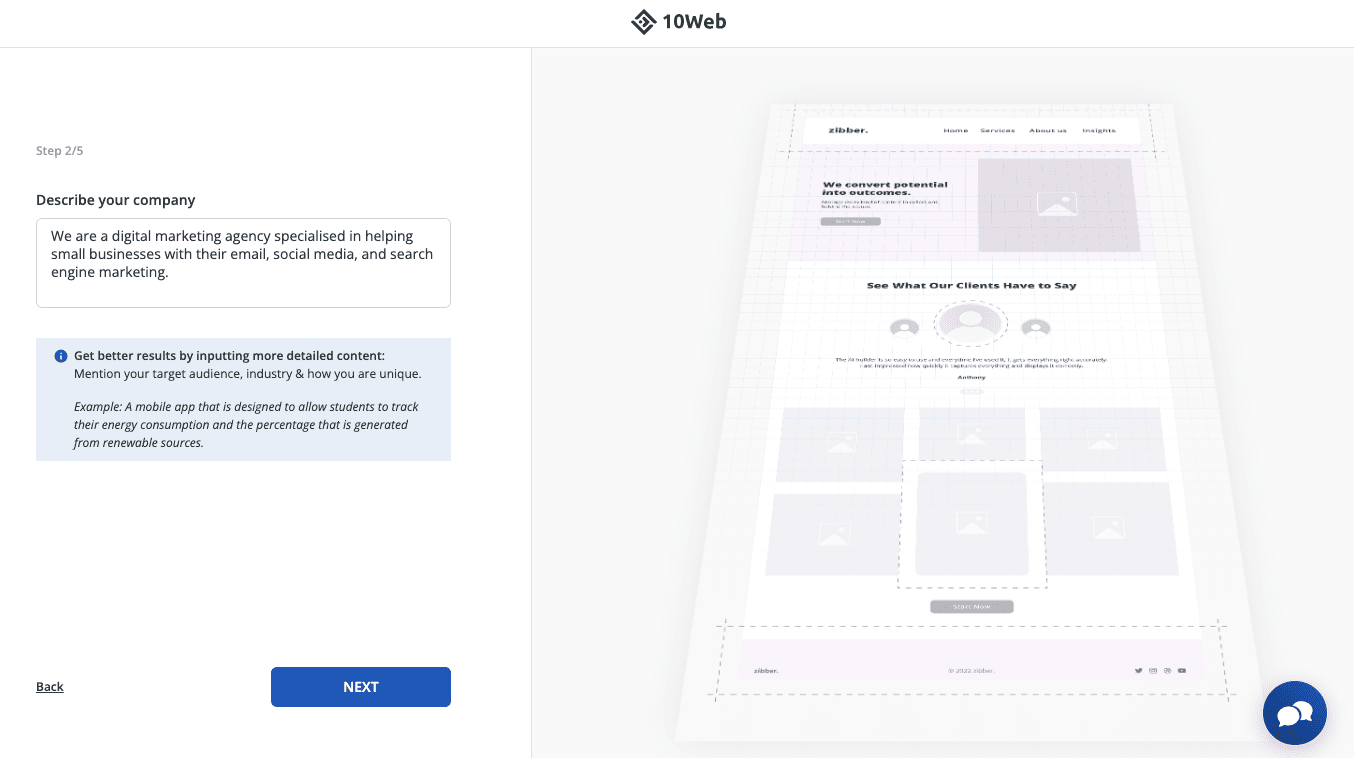
However, when it came time for the builder to actually create the design, it took a couple of minutes to actually do it. Most of the other builders on this list are a lot faster.
Was the builder just having a bad day? I certainly hope so! (Let us know in the comments if you had the same experience!)
Once again, you’ll get access to Elementor’s drag-and-drop site editor, giving you plenty of freedom to customize and edit your site. You can also choose your website’s primary color and font.
Quality of designs?
My first impression was very positive. The generated design was much more polished than many of the others on this list.
For the type of company I had specified (marketing agency), the design was completely on-brand – clean, modern, and professional-looking:
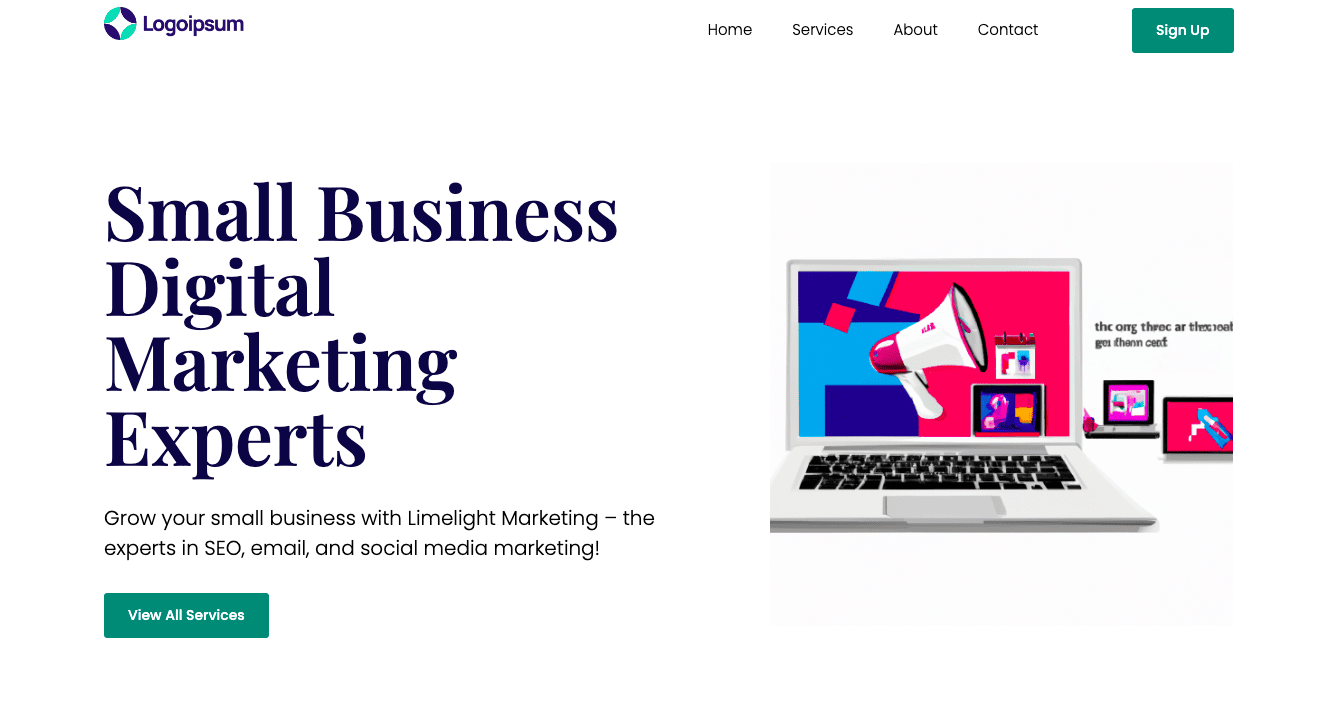
I also liked that it created relevant pages, and pulled in suitable images – even if they were clearly stock images. They work as perfectly adequate placeholders if you want to get a website up and running quickly, but don’t have time to create your own imagery as yet.

But – and this is a pretty big “but” – I was disappointed to find that the site builder suggested exactly the same design for a completely different type of business. Just check out what it created for a bakery website:
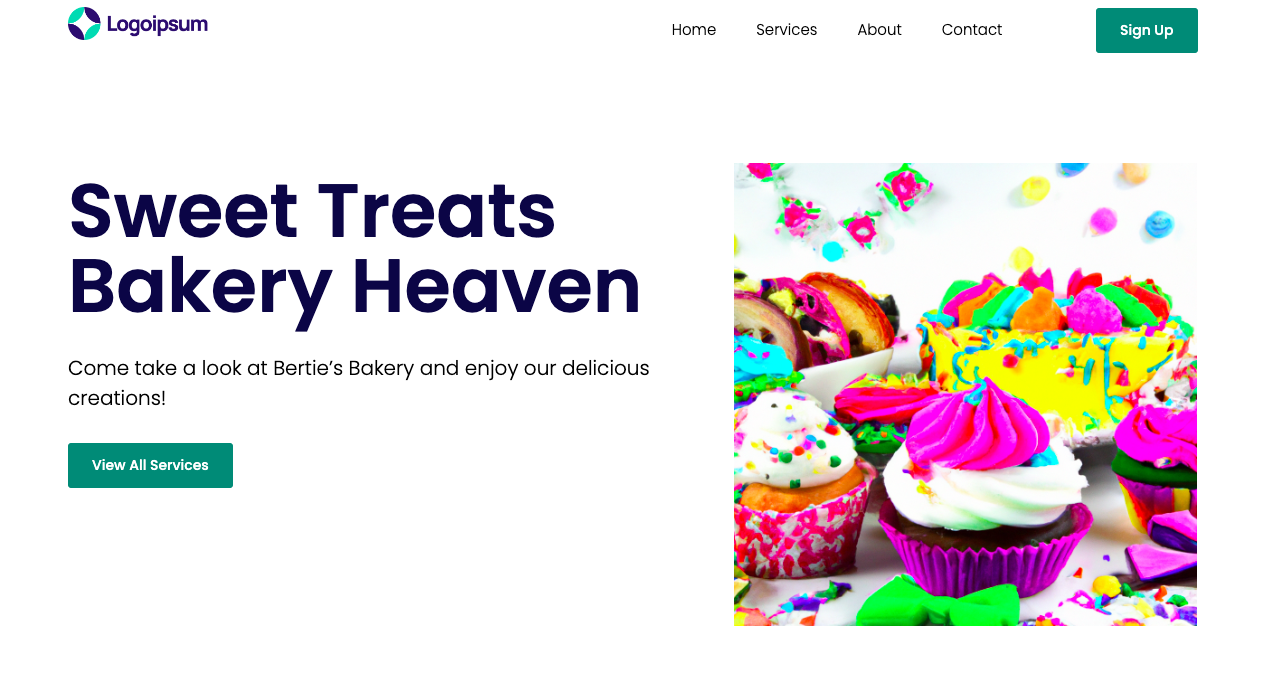
Sure, the images are different, but you’d have to go a long way to make your AI-generated website look unique.
How ‘smart’ is the AI?
As we’ve seen, apart from the suggested images, the visual design isn’t so AI-driven. However, the website builder’s AI assistant does suggest some relevant text, which serves as a pretty good starting point if you need some inspiration on what to say:
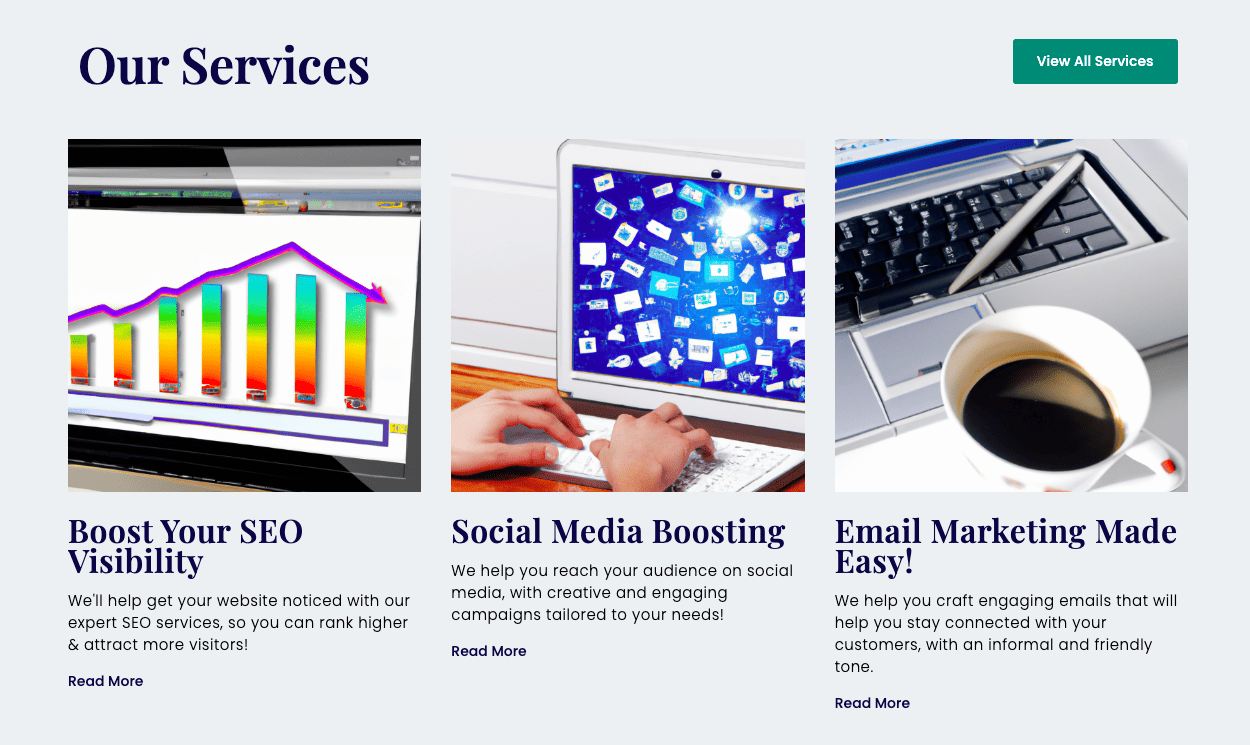
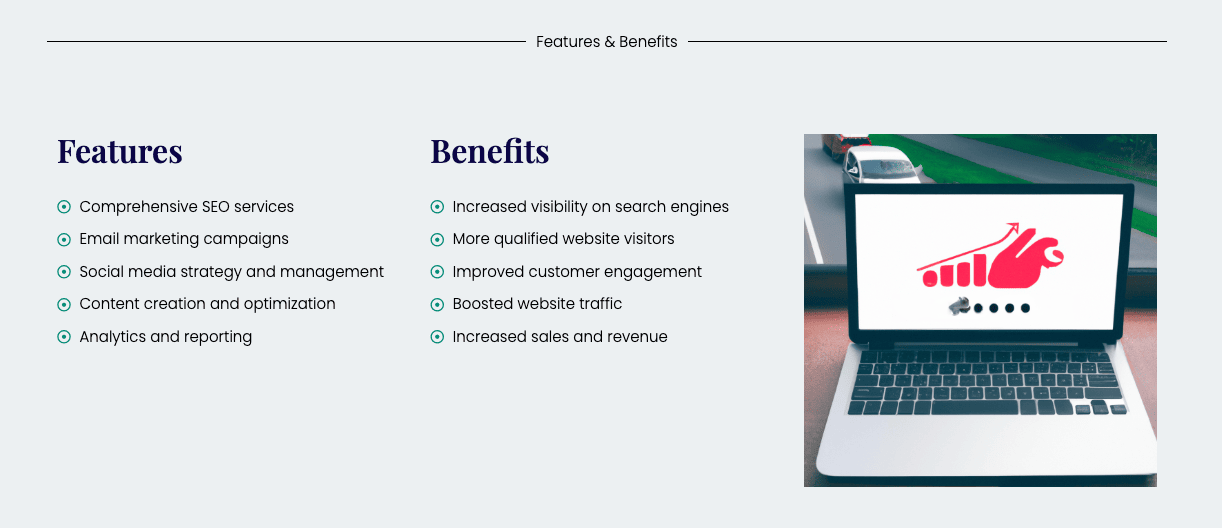
However, I’d always recommend making your own edits in order to avoid sounding like every other website in your industry – especially as readers are getting a lot better at detecting AI-written copy!
10Web Pricing:
10Web offers a range of different plans depending on whether your site is for personal, ecommerce, or agency needs. These include:
- The AI Starter plan, which costs $10/month for up to 5,000 words (paid annually)
- The AI Ecommerce Starter plan is $15/month for up to 10,000 words (paid annually)
- The Agency Starter plan costs $24/month for 3 websites and up to 50,000 words (paid annually)
Rating:
3.5/5. The ability to replicate the design of an existing website is especially compelling. And I liked that you had a lot of flexibility in customizing the design, too. There’s room for improvement, especially in the start-from-scratch builder, but all in all, it’s a fairly solid tool, and a very interesting solution for anyone looking to move their site to WordPress.
8. GetResponse Website Builder
GetResponse has long been one of our favorite email marketing platforms – its marketing automations are seriously impressive. So when we found out they offered an AI-powered website builder too, we were immediately intrigued.
As it turns out, there’s a lot to like about GetResponse’s website builder – not least, its generous free plan, which includes 5GB of bandwidth for your site, plus access to email marketing, form and landing page features.
Also interesting is the fact that you can connect your own custom domain even on the free plan – a perk that sets it apart from many of its competitors.
So let’s dive in and see just how well it works…
How fast is it to set up a site?
Fast! To get started, you don’t even need a GetResponse account – you just need to answer a few questions around the kind of site you want to build. As you can see, there are several categories that GetResponse covers:
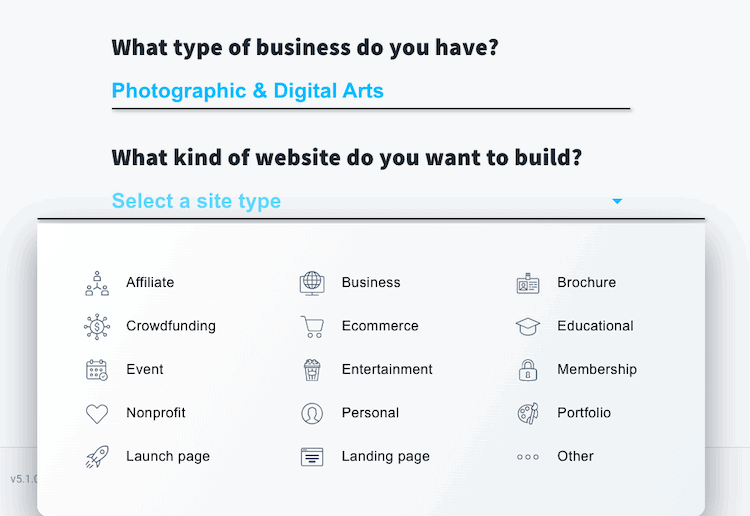
I liked that GetResponse also recommends some extra features your site might need, such as a contact form or pricing table, which you can select or deselect:
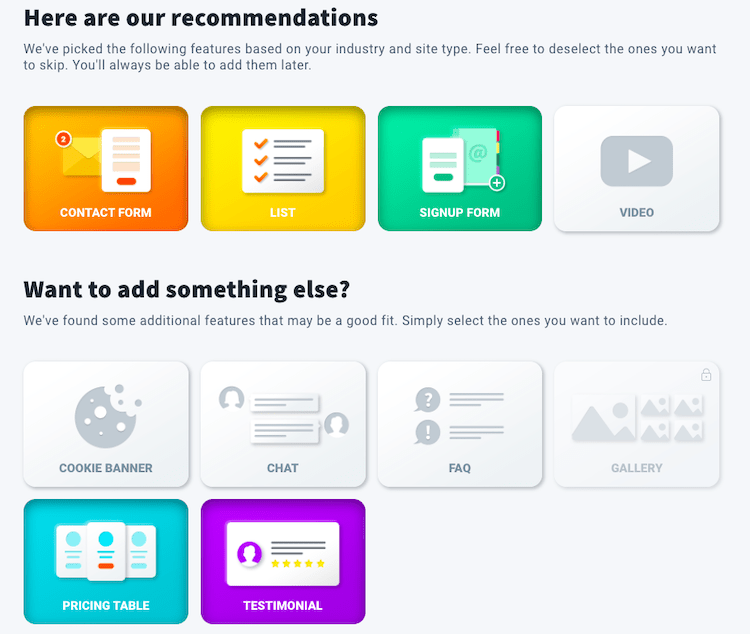
After choosing from a suggested color scheme (you can also pull colors from an uploaded logo or existing site if you don’t like what’s been suggested), you then choose from a handful of different designs for your site:
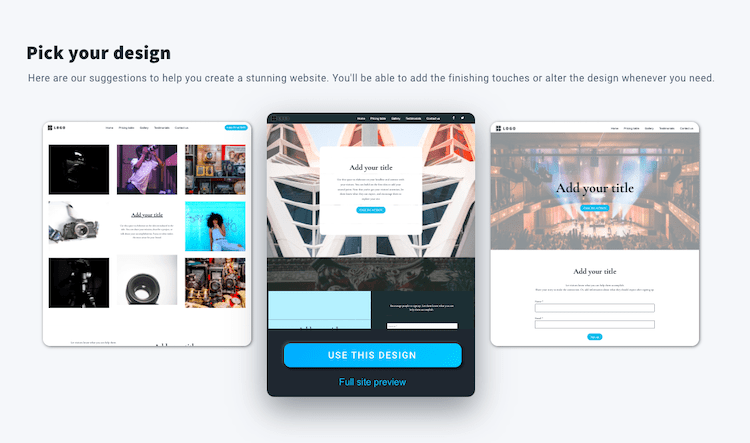
What I really liked was the ‘Full site preview’ feature, which lets you check out the full website design before choosing one – it means you’re not locked into a design that you’re not really keen on.
It’s at this point you’re asked to create a free GetResponse account. The activation process is a little cumbersome (you’re asked to verify via both email and text), but once done you’re free to start customizing your site.
How much can I customize?
A lot! GetResponse’s website editor is very similar to its email editor, letting you drag and drop elements such as images, text, buttons, videos and forms into the page.
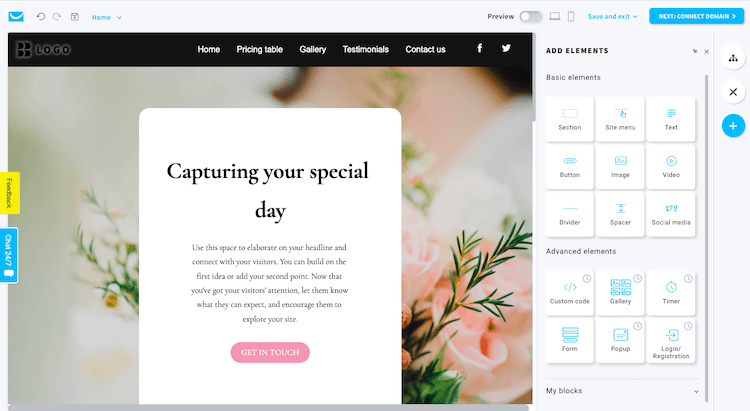
More advanced elements such as HTML blocks and galleries are also available, although these are premium elements – meaning you’ll need to upgrade your account to use them.
It’s possible to change design elements such as color scheme and font, and add new pages. You also have the ability to edit SEO and make pages private. So in terms of flexibility, you have a good amount of control over your site – similar to what you’d get with a more conventional website builder like Weebly or Squarespace.
There’s one notable feature that’s missing though, and that’s the ability to add a blog. If you need one for your website, you’d be better off using Wix’s AI builder.
Quality of designs?
Although on the simpler side, the designs are modern, and are bolstered by the flexibility you have to edit them.
What I found, though, is that if you’ve pulled a color scheme from an existing logo or website, the combinations don’t always work so well in the suggested site designs (the AI doesn’t seem to be advanced enough to recognize a dud design). You might need to do a little bit of tweaking to get the colors right.

A bonus, though, is that you have automatic access to Unsplash’s free stock image gallery, meaning that you can really amp up the design of your site with very little effort.
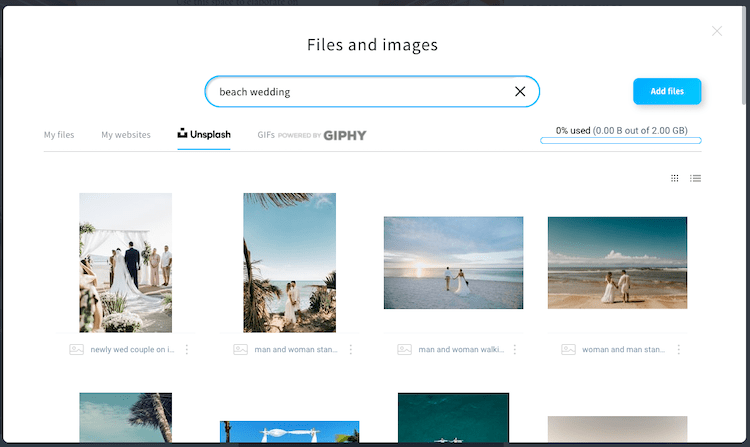
How ‘smart’ is the AI?
From what I can see, the AI is pretty limited, working in just a number of ways:
- The category you choose at the beginning will influence the images used in your suggested site design (for example, if you choose ‘Pizza restaurant’ as a category, you’ll get designs with images of pizzerias and – somewhat randomly – locations in Italy)
- Likewise, your website category will also determine the extra features (contact form, galleries etc) suggested to you, and the color scheme/fonts
- If you have an existing website or logo, you can pull the color scheme using those sources, but as I mentioned before, the end result isn’t always great
GetResponse Pricing:
GetResponse’s pricing is based on the tier you select, and the number of subscribers you have.
- The Free plan lets you have up to 500 subscribers and includes 1 website, plus some email marketing features
- The Basic plan gives you unlimited websites and autoresponders. It starts at $15/month for 1,000 subscribers
- The Plus plan includes unlimited websites and 5 automation workflows. It starts at $49/month for 1,000 subscribers
- The Professional plan gives you unlimited sites and automations, starting at $99/month for 1,000 subscribers
For more details, see our GetResponse pricing guide.
Rating:
3/5. Although the AI aspect of GetResponse’s website builder is limited, its strengths lie in its flexibility, which makes it a more sophisticated website builder than many others on this list. Being an email marketing tool, GetResponse also pays closer attention to analytics – each site comes with metrics not only around visits, but also devices used and links clicked.
9. Shopify AI
Shopify Magic offers a range of AI-powered features designed to enhance ecommerce operations, but it’s important to note that it can’t build a Shopify store from scratch (at least not yet).
One of its key features is its generative AI that creates web copy, including product descriptions and blog posts, tailored to the existing content on your Shopify store. It also provides summary snippets for highly-rated apps in the Shopify App Stores (so you can make a choice quicker), as well as a chatbot that can auto-answer FAQs, chat in real time, and even prompt customers to leave their email for follow-up.
What shop owners are most excited about, though, is Shopify Sidekick – a highly knowledgeable “assistant” that promises to streamline various administrative tasks, from programming sales to adjusting prices, while offering deep insights into their business. It’s not yet available, but I’ll be sure to update this post once it is!
With all this in mind, let’s test out how well Shopify’s AI features – and in particular, its product description generator – work.
How does it work?
When you see a purple star icon in your Shopify admin area, that’s where you can use Shopify Magic to generate text. This works for product descriptions and emails in all languages, and for blog posts in English only. To start, you’ll need to write a prompt, including features and keywords for product descriptions, as this is crucial for maximizing the AI’s capabilities.
How ‘smart’ is the AI?
While Shopify Magic lets you pick a tone of voice to keep your brand copy consistent, it’s a bit hit or miss. Issues include repetitive adjectives, minimal differences between tones, and custom tones often missing the mark – as you can see in the example below.
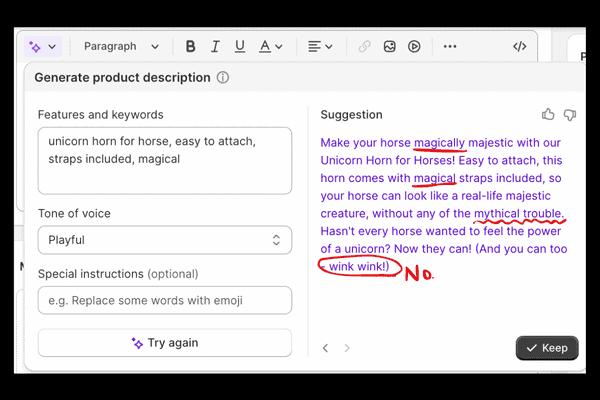
This Shopify-generated copy for horse accessories store Unicorn Corner is a little out there!
I didn’t run into any wild AI mishaps in my testing, but I did spot some grammar slip-ups and odd wording. Here’s hoping they polish it up as they keep tweaking the AI!
How does it compare to other content generators like ChatGPT?
Shopify Magic and ChatGPT are quite similar since they both use machine learning models. Neither is consistently better; sometimes one nails it while the other falls short.
Both can be a good starting point for generating content, but you might find some awkward phrasing in their suggestions. However, it’s worth keeping in mind that Shopify Magic is more tailored to ecommerce and can even learn from your existing website content.
My advice? Try both and mix the best parts from each to suit your brand.
Shopify AI pricing
Shopify Magic is available for free to all Shopify users, regardless of their plan. Shopify pricing starts at $29 a month.
Rating:
3/5. Shopify’s AI is a great productivity booster, but it’s not replacing human creativity anytime soon. Consider it more like a creative partner, helping you brainstorm and automate tasks. While it shines in automating marketing and crunching big data, I still think humans have the upper hand when it comes to the creative aspects of running a business.
10. Webnode
While Webnode might not have the household name status of giants like Wix or Squarespace, we’ve been singing its praises for years. Why? Well, for starters, Webnode boasts a refreshingly simple builder that doesn’t overwhelm you with options. Plus, it’s got a trick up its sleeve that sets it apart – a handy language switcher that makes setting up multilingual sites a breeze.
Joining the ranks of other website builders venturing into the AI realm, Webnode’s AI-powered builder promises to craft personalized websites, complete with fitting text and images. But as you’ve probably noticed, I’ve placed it almost towards the end of this list of AI website builders.
Wondering why? Let me show you.
How fast is it to create a website?
After signing up, you’re asked to choose whether you want to build a website, online store, or blog, and have the option of choosing an AI-built site, or starting from a template.
You’re asked the usual questions – your website category, what features you want to add, business description, and contact details:
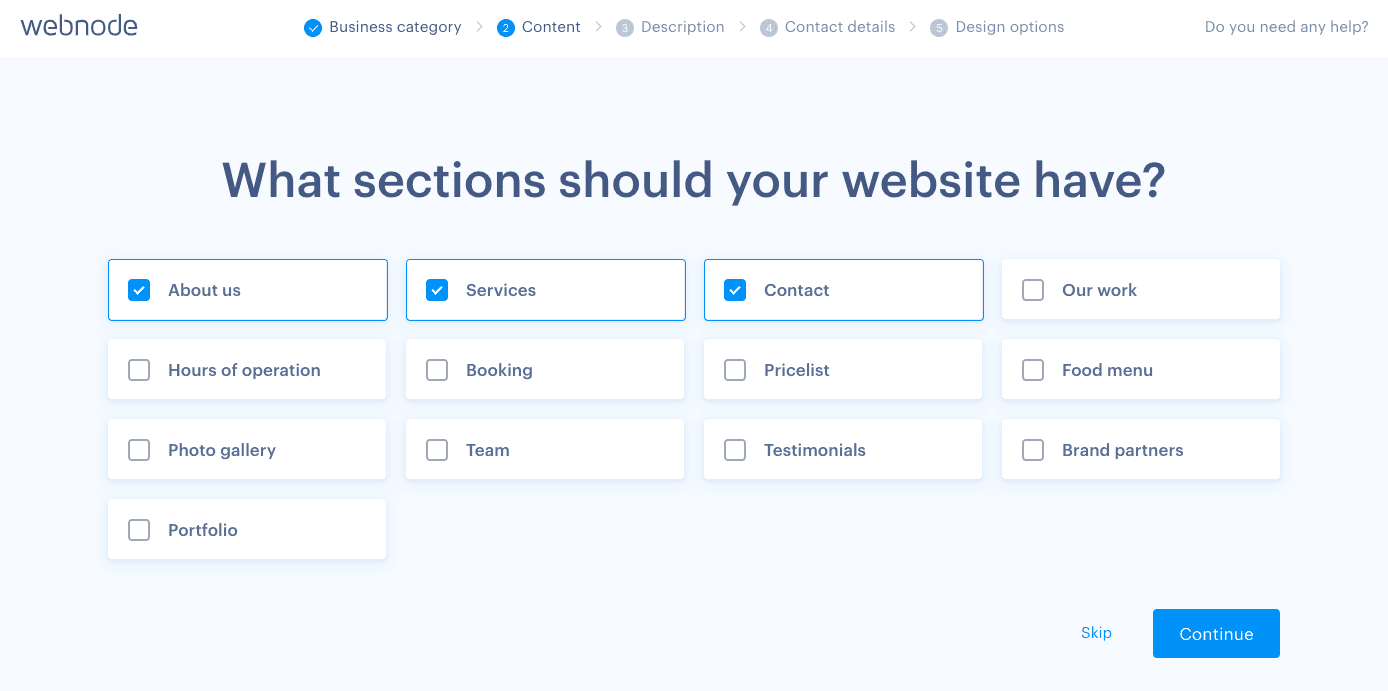
You’re then asked to select from one of three available designs:
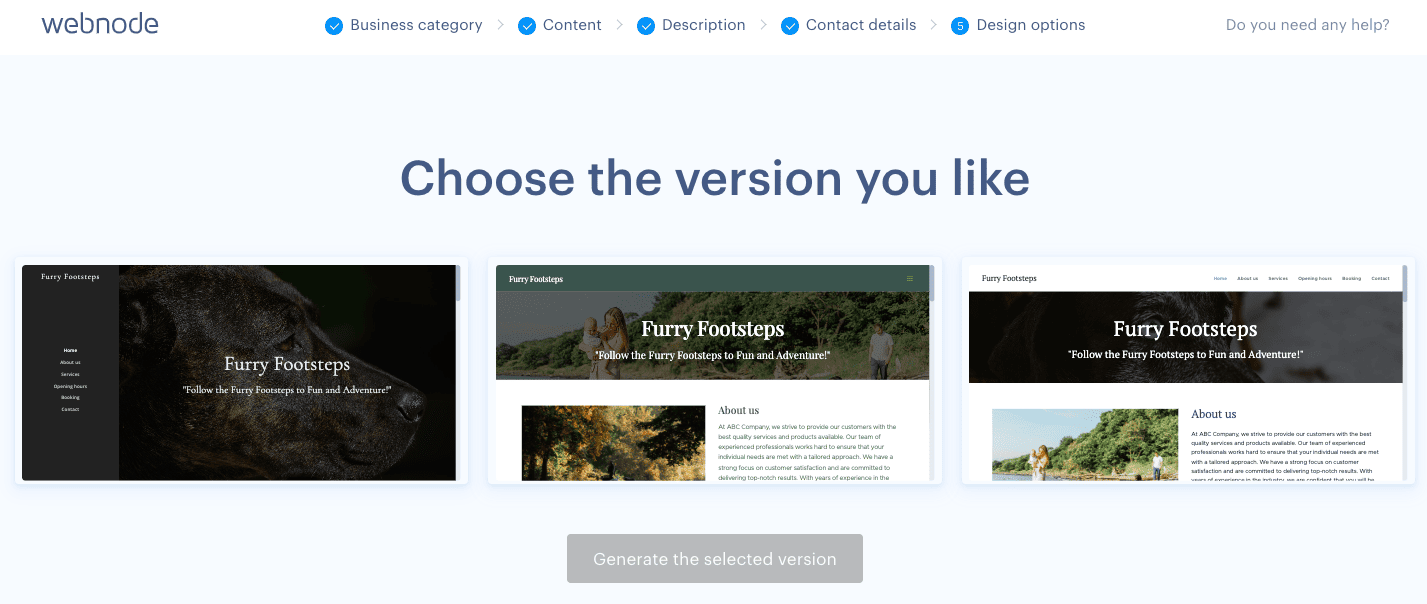
Overall, the process was very simple and quick. But did the final design impress? Let’s find out.
Quality of designs
Now, here’s where things took a bit of a turn for me. Despite being handed three design suggestions, I couldn’t help but feel a tad let down. When I compared them to the fresh, modern designs you can find on platforms like Wix or Hostinger, Webnode’s offerings seemed a bit dated, and lacking that special something.
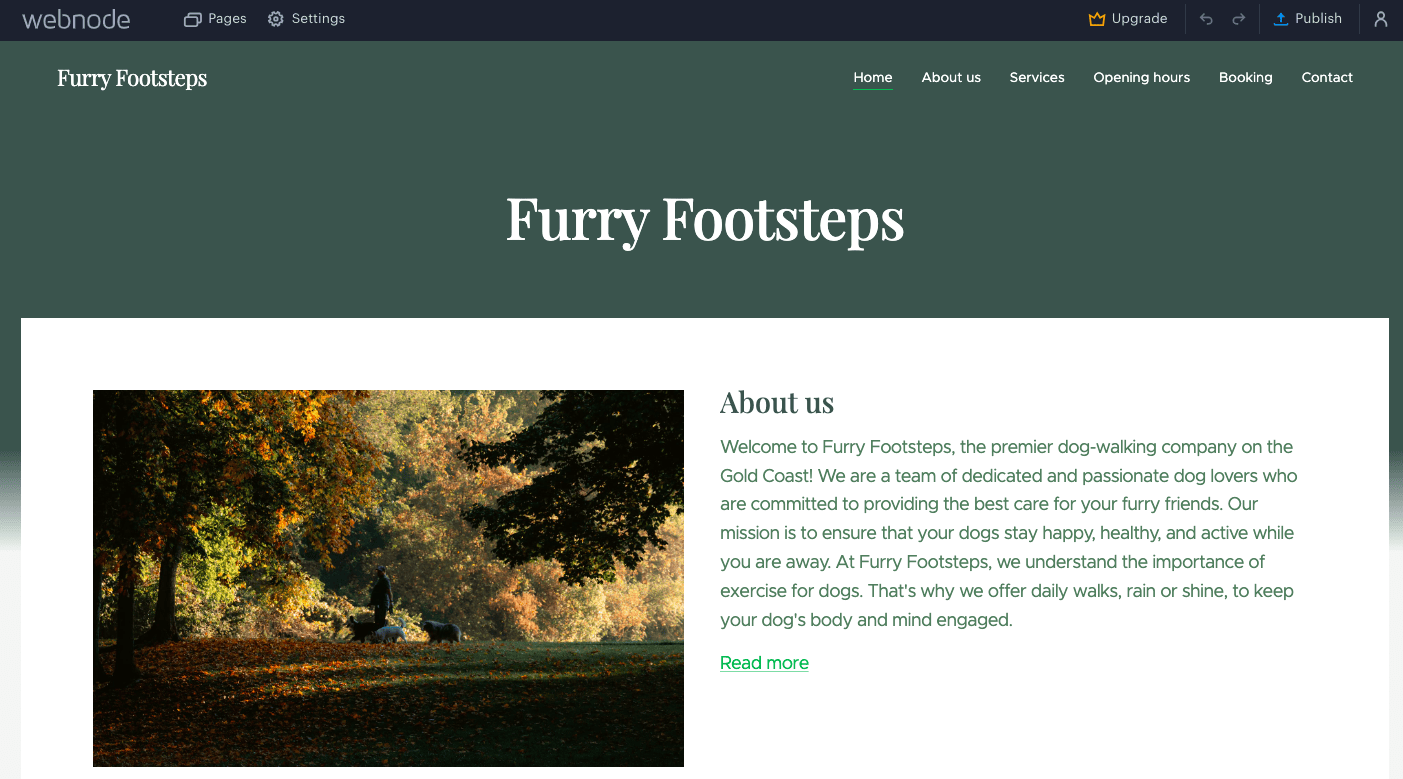
The color choices didn’t really pop, and they didn’t match the lively and fun vibe I had in mind for my make-believe dog-walking company’s website. (Not that I expected them to read my mind – but let’s not forget, Webnode didn’t even give me the chance to define the tone I wanted.)
To add to the mix, many other website builders out there let you generate more design options if the initial ones don’t tickle your fancy. But not Webnode – they stick to the “three choices and that’s it” rule, which left me with less room to play around and experiment.
How much can I customize?
Webnode’s AI builder lets you edit your site in its regular website editor, so you get the option to change all the suggested images and copy, as well as add in new pages and sections.
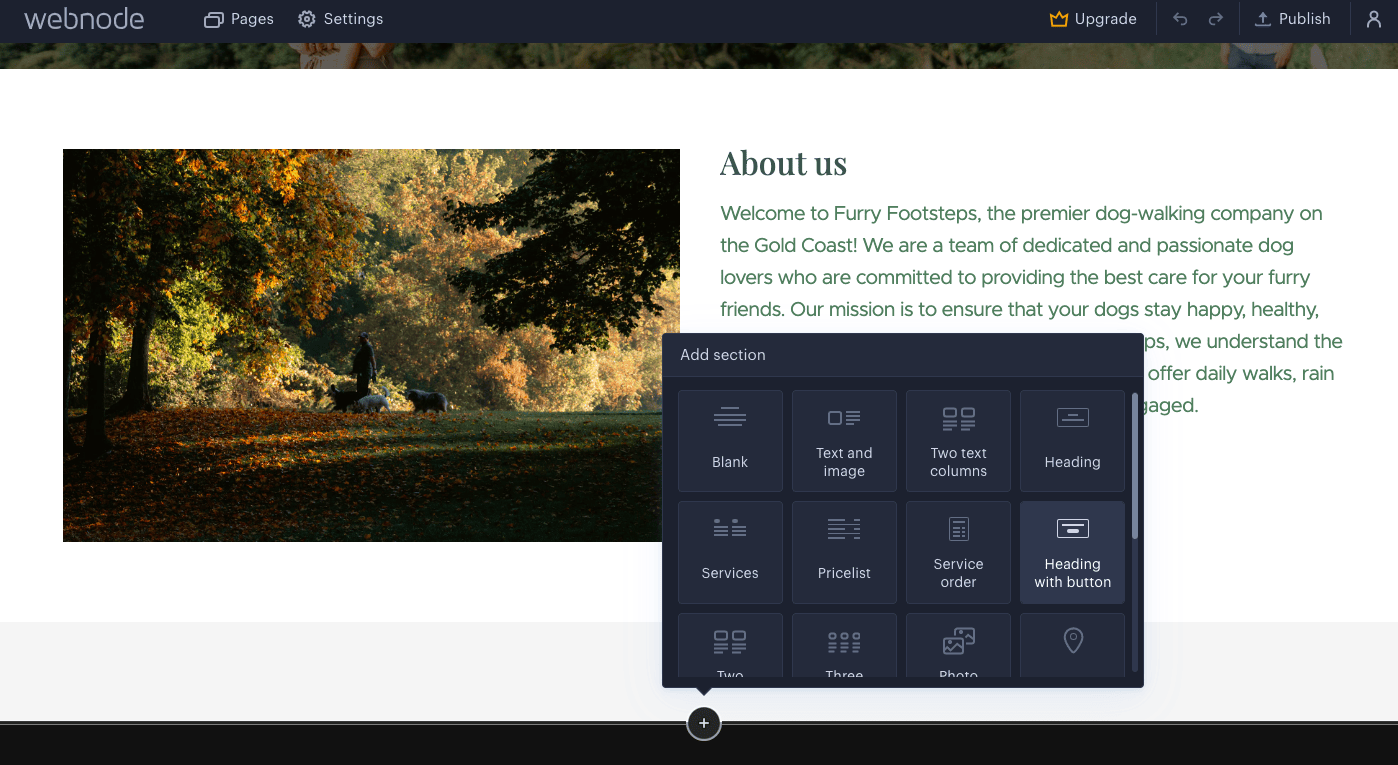
The absence of full drag-and-drop functionality might limit your creative freedom, especially when compared to web builders like Wix, as you may not be able to position content exactly where you want it. But if your website’s primary aim is to provide essential information, such as services, pricing, and contact details, Webnode will certainly get the job done.
However, I was disappointed by the limited options for changing stylistic elements like fonts and colors. For example, you can only choose from a few preset font pairings:
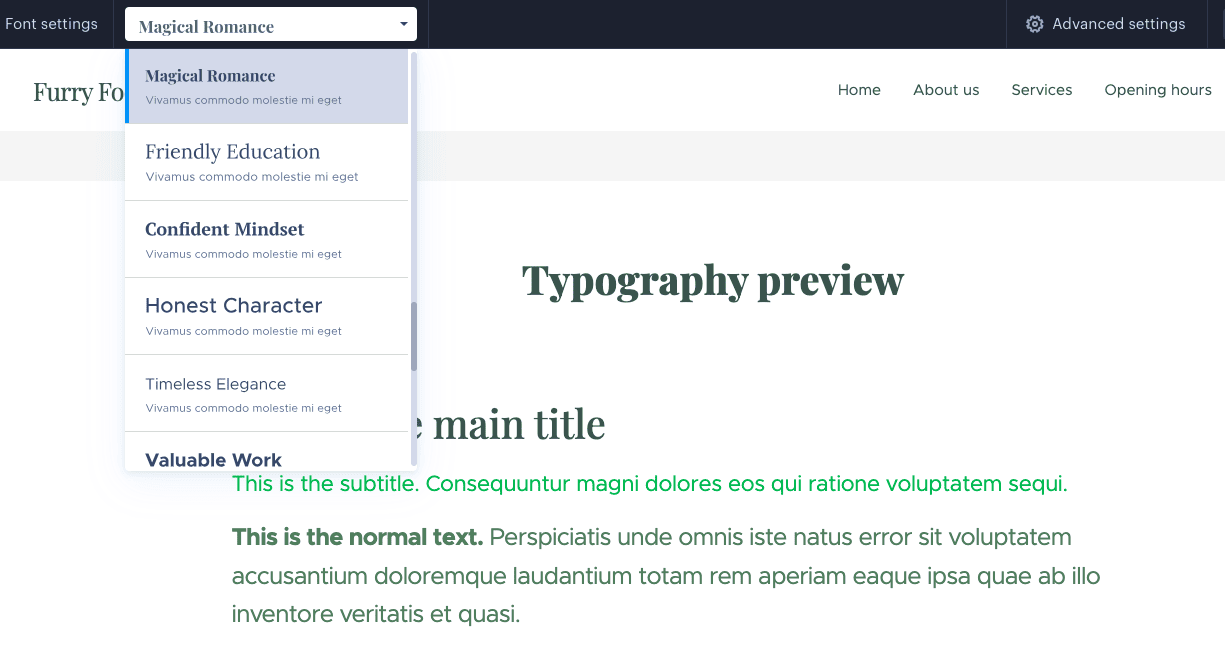
This lack of design flexibility wouldn’t be such a sticking point if the initial designs weren’t so lackluster to begin with. It’s safe to say that in this regard, Webnode lags behind some of the other website builders on this list.
How ‘smart’ is the AI?
At the risk of sounding repetitive, the AI-generated design didn’t exactly knock my socks off. Sure, it threw in a bunch of dog-related images (pulled from Pexels), but the overall look felt a bit too generic and didn’t quite hit the mark for my specific niche.
What really stood out, though, was the AI-generated text. Much like the helpful content produced by Durable and GoDaddy, I can see how Webnode’s text suggestions might serve as handy starting points, especially if you’re kicking off your website from scratch and need a little nudge in the right direction on what to say.
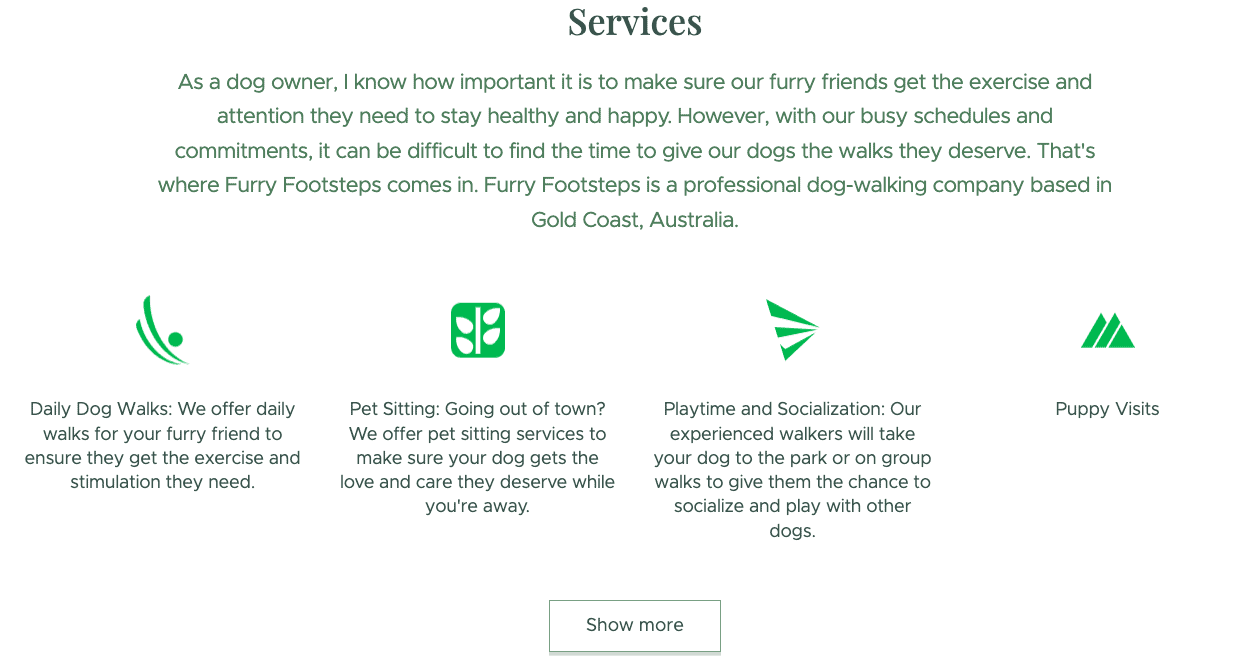
You can view the final site here.
Pricing
Webnode’s Free plan lets you test the builder without spending a dime, but your domain will be yourwebsitename.webnode.com, and there’s a prominent banner ad on your site – not ideal for professional websites.
In my view, the best value plan is the Standard plan, which costs $12.90 per month – it removes Webnode ads and unlocks multilingual, membership registration, and ecommerce features.
Good news: the AI website builder is available on all of Webnode’s plans.
Rating:
3/5. When it comes to Webnode as an AI-powered website builder, don’t expect jaw-dropping design fireworks. However, if you’re in the market for a practical and budget-friendly solution, it’s worth your attention. The AI-driven copy generator can be a lifesaver, especially if you’re venturing into website creation without a clear vision or starting from scratch. Webnode’s multilingual features also make it a top pick for those looking to connect with audiences across different languages and regions.
11. Squarespace
Squarespace has carved a niche for itself as the go-to platform for designers and creatives, thanks to its sleek, minimalist designs and eye-catching templates. Not just a haven for portfolios and artistic showcases, Squarespace also boasts robust blogging and ecommerce capabilities.
Its latest offering, Squarespace Blueprint, might not be a full-fledged AI website builder, but it certainly dabbles in artificial intelligence, featuring an AI-powered writer to craft your site’s content.
So, let’s take it for a whirl and see how effortlessly we can create a stunning website using Squarespace Blueprint.
How fast is it to set up a website?
As a “guided design system,” Squarespace Blueprint takes a different approach than typical AI website builders, requiring a bit more input on your end to put together your website design.
Instead of just answering a few questions for automatic recommendations, you’ll craft your homepage by selecting from a variety of section layouts. You’ll also choose from a range of color palettes and font pairings to nail the look you’re going for, and select additional pages if needed.
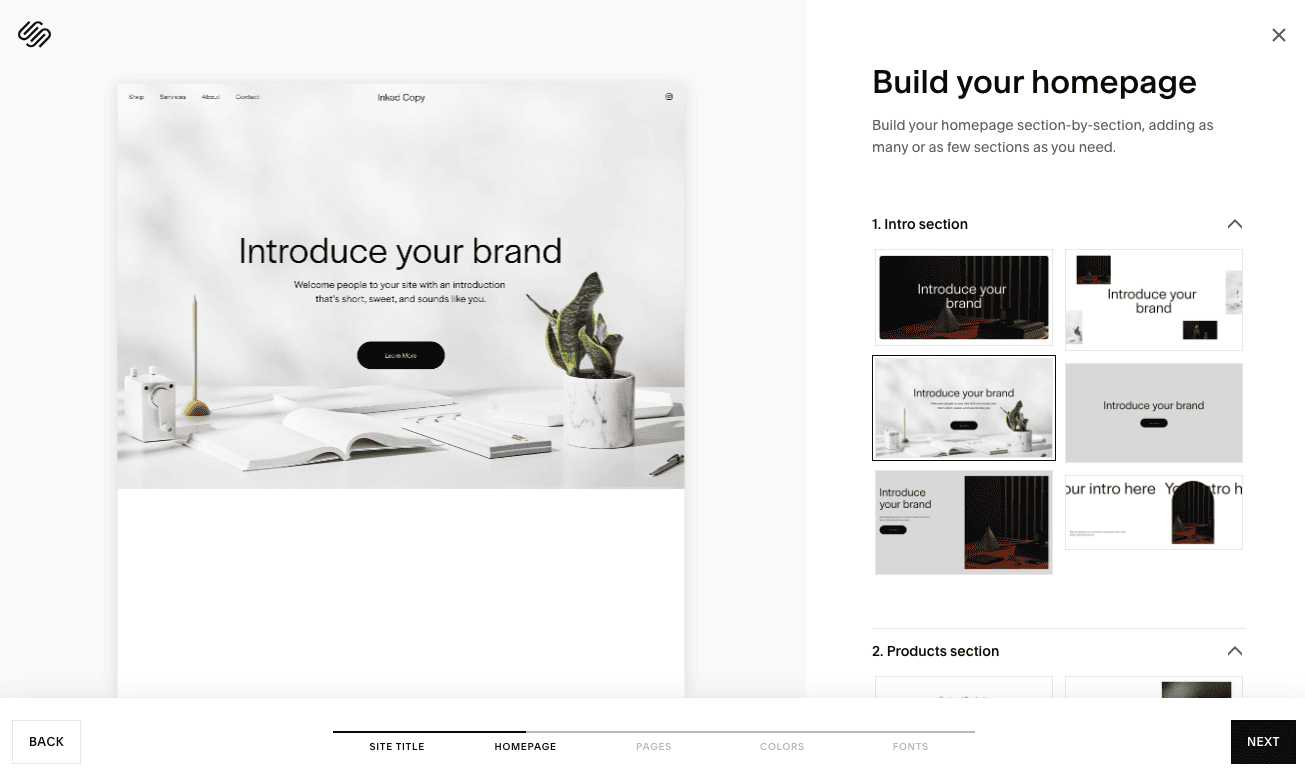
While it involves a few more steps compared to other AI builders, the overall process is still relatively quick.
Once you have your basic design put together, the editor will ask if you want to automatically generate your website’s homepage copy – which is when the AI element of the builder kicks in. If you choose this option, you’ll be asked to provide a short description of your site:
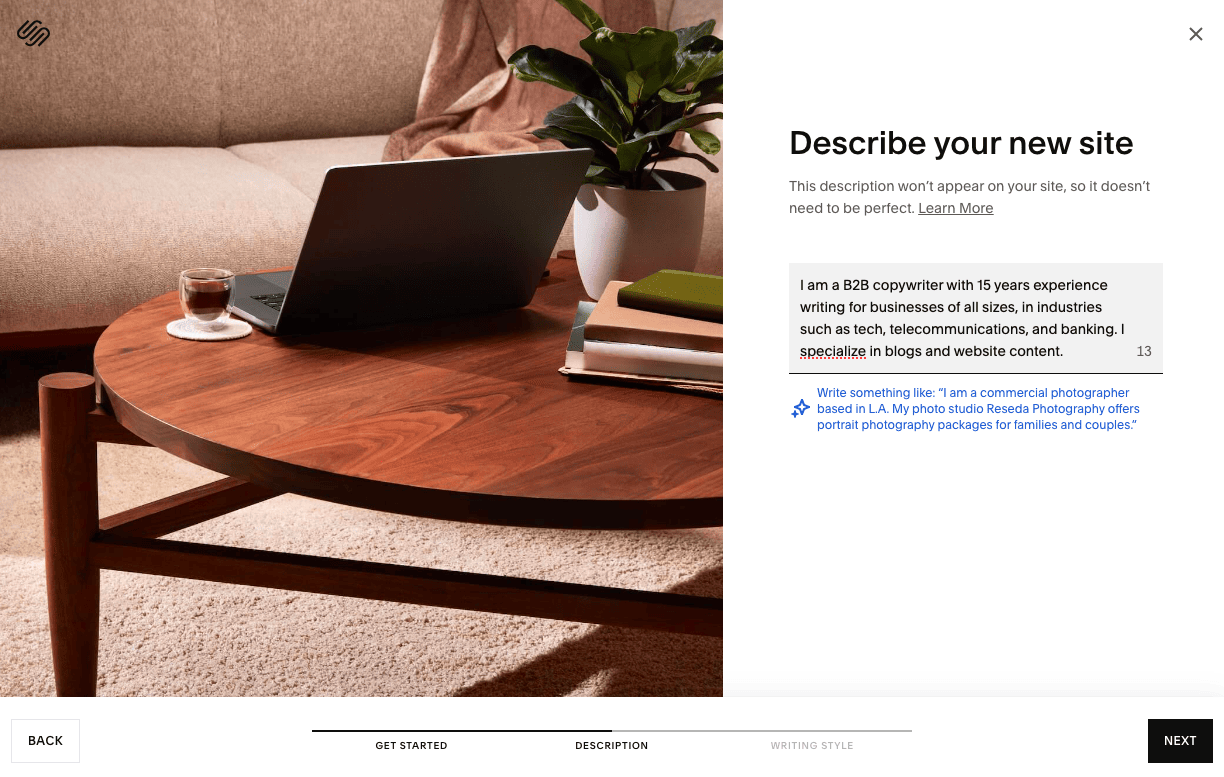
It will then ask you to pick a writing style – neutral, playful, professional, friendly, informative, or quirky – and provide a handy preview of what you can expect with each option.
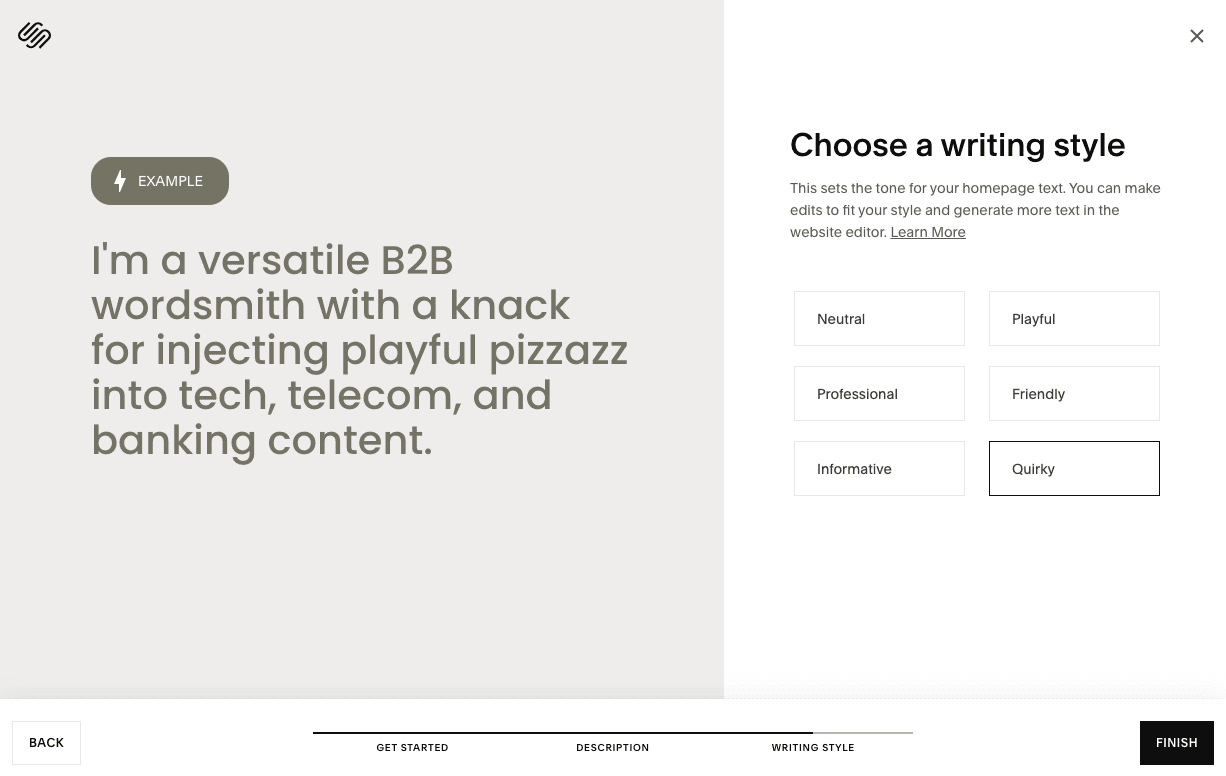
But, here’s the slightly confusing part. When it took me to my website, it didn’t include any of the AI generated copy at all:
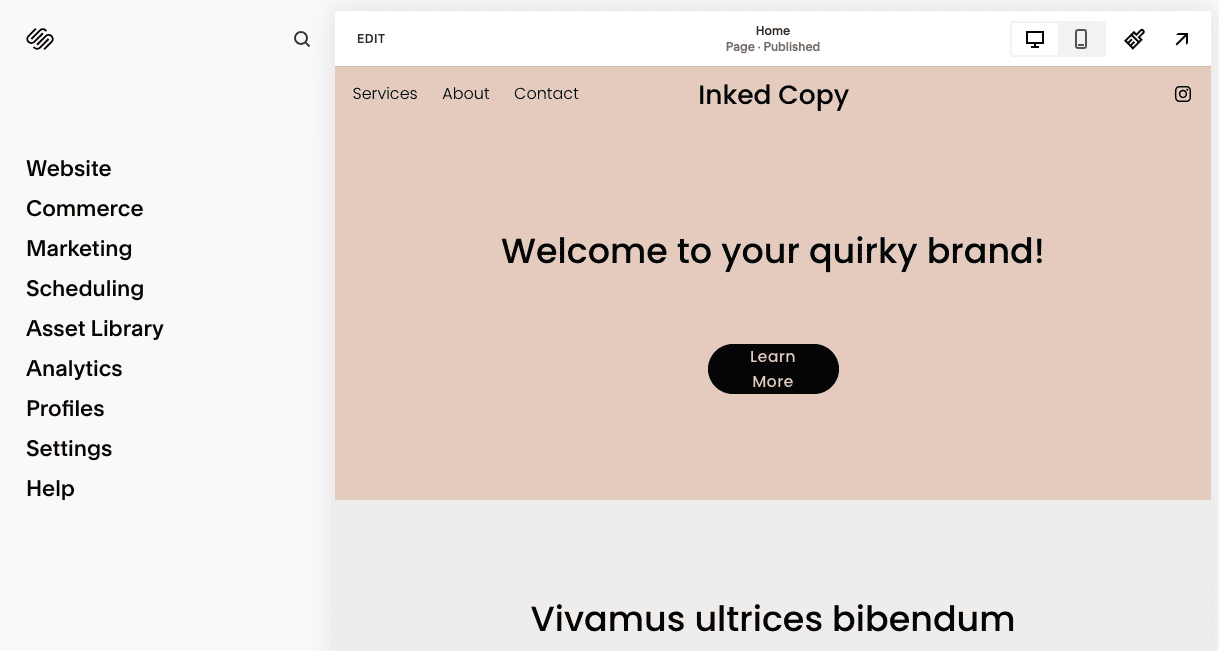
I’m really hoping this was just a one-off while Squarespace sort out a few teething issues (Squarespace AI is still in beta, after all)! In any case, it’s possible to create AI-generated copy for your site by clicking on ‘Edit’, selecting a text element, then clicking the lightning flash icon:

From there, you can give it a prompt about what kind of copy to write and the tone you’d like to use.
How ‘smart’ is the AI?
Honestly, I’m still a little on the fence with this one. Check out what it wrote when I asked it to write a witty headline about the power of well-written copy (for a copywriting services website):
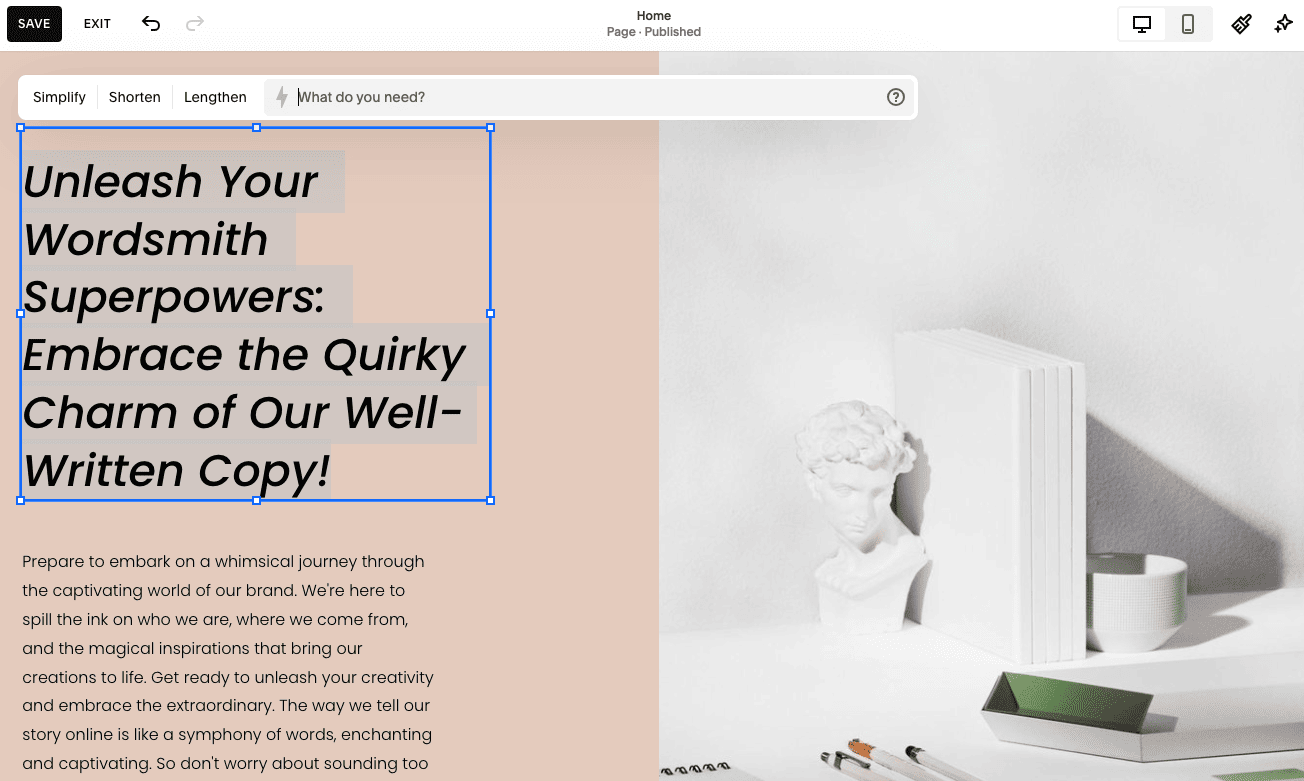
And this is what happened when I asked it to tweak it to make it more specific to a business audience:

Apart from completely forgetting about the fact that I had originally asked it to write a headline, I still didn’t feel like the messaging was 100% right. It doesn’t seem to process “tweaking” requests very well – instead, you need to craft the prompt from scratch every time and be very specific about what it is you’re after.
Quality of designs?
Since it’s not a fully AI-driven builder, Squarespace Blueprint doesn’t offer a completely personalized design. You’ll need to add your own touches, like relevant images. The upside is that you start with a chic, minimalist foundation typical of Squarespace.
Plus, it uses the standard Squarespace editor, making it mostly easy to tweak your site. However, it doesn’t provide the full drag-and-drop flexibility you’d get with builders like Wix or Hostinger. For more on editing a Squarespace site, check out our Squarespace tutorial.
Squarespace pricing
Squarespace Blueprint is available on all plans. Squarespace plans start at $16 per month for the Personal plan, which is ideal for blogs, portfolios and personal websites. Its cheapest plan for selling products is the Business plan, which starts at $23 per month.
Read more about Squarespace pricing in our guide.
Rating:
2/5. While I’m quite fond of Squarespace and see Blueprint as an excellent option for those who like to start with a blank slate, its AI features still have some catching up to do compared to competitors like Wix.
AI website builders: Conclusion
So are AI website builders ready to completely turn the world of website building upside down?
Well, not quite. The intelligence just isn’t as advanced as most users would probably like it to be. That’s probably also the reason why we had to remove two AI website builders when updating this article. Both impress.ly and Sacha by Firedrop seem to have gone out of business.
Does the rest of the pack still provide value?
Absolutely.
For those who would like to cut down the amount of work needed to build a site – beginners, for example, or users who need a site launched quickly – AI web builders offer an easy and affordable solution.
And not just for simple sites. Some tools allow for some pretty advanced sites – online stores and mobile-friendly sites, for example.
As long as you’re okay with giving up some of the control – especially over aspects like search engine optimization (SEO) – you might find that an AI web builder will be enough to serve your website needs.
If you want to keep all your options open, though, we’d recommend Wix AI Website Builder. They manage to square the circle by letting you jump into Wix’s regular editor where you’ll enjoy full customization flexibility. And they are an established brand that is here to stay.
It’s worth noting that more and more website builders are also incorporating AI features to help you with the content creation side of website building (Shopify AI being a prime example). We also reviewed the best AI chatbots, for those who are in need of one. And if you need some help creating additional content for your website, Chat GPT can help you with that.
Got any questions about AI website builders? Or experiences to share? Let us know in the comments below.
We keep our content up to date
14 Mar 2025: Bookmark removed from the list
12 Dec 2024: Hostinger updated
04 Dec 2024: Shopify AI video added
31 Oct 2024: Dorik new prices
29 Oct 2024: Wix AI updates
27 May 2024: Updated Hostinger Website Builder
13 Feb 2024: Added Dorik
23 Oct 2023: Added Durable and Webnode
4 Oct 2023: Added GoDaddy, Shopify and Squarespace, removed Constant Contact
29 Sep 2023: 10Web pricing updates
30 Aug 2023: Wix pricing changes reflected
26 Apr 2023: Updated Hostinger profile
25 Apr 2023: Video review added
16 Mar 2023: New 10Web AI builder added, changes to Constant Contact and Hostinger's builders
16 Feb 2023: Zyro is now called Hostinger Website Builder
21 Dec 2022: Added Zyro
24 Oct 2022: Pricing updates and other smaller corrections
05 May 2022: Removed impress.ly and Sacha by Firedrop.ai as they've shut down
19 Jan 2022: GetResponse website builder added
4 Feb 2021: Constant Contact website builder added
18 Dec 2020: 10Web AI Builder added
THE BEHIND THE SCENES OF THIS BLOG
This article has been written and researched following a precise methodology.
Our methodology